#to get to this exact scene would take an equivalent of multiple seasons
Explore tagged Tumblr posts
Photo

Them. The unholy duo.
#darktide#warhammer 40k#psyker#zealot#oc moggy#oc harald#oc#digital art#sketch#m n c art#sth cute and happy in this grim universe; eh?#to get to this exact scene would take an equivalent of multiple seasons#we stan an unlikely pair that grows together#somewhat#they're getting there
14 notes
·
View notes
Text
Seasons Greasons: A Meta Analysis based on Caspar's Culinary Palate + Return Gift For Shez's Whistle
AKA: no one should ever 'jokingly' challenge me to write a meta to my irl face. take these 1k words now
THE BACKSTORY:
May 6th, Baltimore Inner Harbor. It was a lovely day—by which I mean the sky was grey and gloomy and decided to start spitting a fine mist down from the clouds as soon as Lucius and I stepped out of the light rail and started our trek toward our destination. Our destination being a birthday celebration for Erica, which obviously made the day lovely regardless of the weather. At this point we had already gotten past the 'hello's and reciprocal 'oh god you really are shorter than i remember's, and had settled into our table at the cafe. Inevitably, the conversation quickly turned to Fire Emblem. We are who we are.
Playthroughs of Warriors: Three Hopes entered the scene, and then discussions of the Merc Whistle mechanic. "I haven't given mine away yet." I said. "Don't they give you a return gift that you can wear as an accessory to use their special ability?"
I pulled out my phone. I learned that Caspar's return gift to Shez was called Seasoning Set. Across the table, past the strangely shaped flasks of hot water and growing number of drained shirley temple glasses, N "Njamin" Von TOAmod smiled at me and said "I expect a meta post about Caspar's seasoning set on the dash by [due date]*" *I do not remember the exact phrasing, nor the initial due date. I am going to say it was 'next month', that way I don't get any of my extremely real roleplayer points docked for tardiness.
And thus, I was committed to the bit. Straight up married to it. Welcome to the wedding. The reception is catered, obviously, and we'll be serving—
Well. I'm getting to that.
THE SEASONING SET
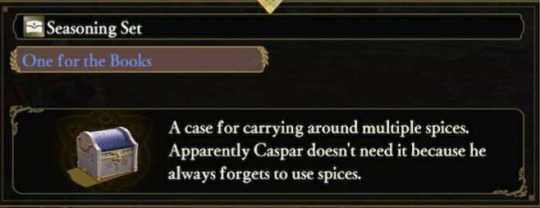
(This is a crunchy screenshot that I cropped myself from my own Switch. Forgive me)
The details of note to me are:
Clarifying that you have matched your bestie/S-support equivalent's sentimental gift with something you "don't need" is so rude LMFAO. I'm glad he is keeping up the same behavior from his story about a girl trying to ask him out to the Goddess Tower in Three Houses where he seems to totally misread a situation and make an ass of himself by dismissing the person/not matching their energy. Really beautiful stuff.
Multiple spices, you say? Looks like I have to come up with more than one. It's not just salt in there.
CASPAR'S COOKING SKILLS
They are bad. He has a big red downward-facing arrow next to his face in the list of candidates for cooking together in Three Houses. If you choose to let him cook anyway, he tells you his pitfalls himself:
"All right! Leave it to me! I'll fry it, grill it, and try not to burn it!" / "Sorry for making you do all the work, Professor. I mess up the ingredients every time!"
With this info, I am taking the text saying "he forgets to use spices" very literally. The impression I get is he gets so overwhelmed by multi-step cooking processes that he loses track of ingredients. He does like some spices in his food and drink, though, so I will presume that the spices in his seasoning set are ones that he would enjoy putting in his food if he ever remembered to toss them in.
THE FAVORED FLAVORS
The easiest spice choice comes directly from his favorite type of tea.
Ginger Tea: "The sharp spiciness of ginger laces the body of this tea, unforgettable and brightening."
Bam. Right there. We can put ginger on the list. For the rest, I'll take a look at the dining hall dishes he likes that fall under the Spicy category.
Sauteed Jerky: "Jerky aged in the monastery and sautéed for a delightfully salty flavor. A perfect snack to go with your favorite drink."
The description doesn't give me any seasoning beyond salt, but according to the resources on serenesforest this dish is counted as a spicy one! When I think of spicy jerky (and look up a few recipes to confirm my memories) I think of a peppery sort of sensation on the tongue—black pepper and cayenne (or other hot peppers).
Sauteed Pheasant and Eggs: "Thin slices of bird meat and shredded cabbage, mixed with scrambled eggs and sautéed with spices. Invention of a certain noble."
This one gave me no hints as to what types of spices. RIP. I relied much more heavily on googling for this one, and settled on interpreting this dish as a take on anda bhurji, maybe?? (literally 'scrambled egg'. it's an Indian scrambled egg dish). Online recipes for this one gave me spices such as turmeric, coriander, red chili, and ginger.
THE SEASONING LIST
Just to have it all in one place, here's all the hypothetical seasonings I've thrown out all put together:
Salt
Black Pepper
Ginger (mentioned x2!!)
Cayenne/Red Chili (or whatever Fodlan equivalent capsacin-haver there might be)
Turmeric
Coriander
Go forth, Shez. Make a delicious spicy scrambled egg dish. Perhaps you can share it with friends for brunch. That'd be a beautiful way to bring things full circle, don't you think?
BONUS: MY BOY HATES FISH
I just think it's so fucking funny that he hates every seafood dish. Look at this list of foods he hates.
Grilled Herring, Fish and Bean Soup, Small Fish Skewers, Spicy Fish and Turnip Stew, Onion Gratin Soup, Sweet and Salty Whitefish Sauté, Fruit and Herring Tart, Cheesy Verona Stew, Fish Sandwich, Super-Spicy Fish Dango, Pickled Seafood and Vegetables, Two-Fish Sauté, Gautier Cheese Gratin, Cabbage and Herring Stew, Bourgeois Pike, Fried Crayfish
Only three out of this list don't have something referencing fish/seafood right in the name, and two out of those three do have fish in the ingredients if you go looking:
Onion Gratin Soup: "Onions stewed with white trout and baked with a layer of cheese on top. Will warm you up from the inside out." Cheesy Verona Stew: "A rich dish consisting of verona and sautéed Teutates loach. These ingredients are boiled and served with two kinds of melted cheese."
Maybe there is something he dislikes about gratin, though, since he dislikes Gautier Cheese Gratin as well. A texture problem, perhaps? Either way, it doesn't feel as prominent a dislike as his thing with fish—the guy also hates the Fishing Float gift. Caspar is a certified fish hater. This makes his participation in the fishing tournament even funnier to me: he will straight up make an exception for his seeming disdain for fishing if it's turned into a competition he can try to win. Definitely no way he was eating his catch though. Maybe he fed it to his cat friend from his supports with Ashe, lmfao
Anyhow, I'll leave off with this silly indulgent little meta here. Thanks for playing along! ilu toa ❤
#[ ooc ]#[ headcanon ]#// queueing this and going to bed so nobody knows how long i stayed up doing this
21 notes
·
View notes
Text
Romance in Samurai Champloo: The Mirror Reflection of Jin and Shino and Mugen and Fuu
Upon re-watching Episode 11, I was utterly shocked by how many parallels exist between Mugen and Jin as characters, in regards to their relationship with the most important women of their journey. The interactions and concepts are near identical. These specific themes and interactions were only exhibited with two specific women, and no other characters in the series.
In episode 11, Jin falls in love with Shino: a courtesan who was forced into prostitution due to her lousy, abusive husband's gambling debt. Jin later saves Shino from this brothel, and helps her escape to a divorce temple.
Canonically, it was stated in the Samurai Champloo Roman Album by Shino’s character designer that Jin does indeed "fall for" her, so it was not simply chivalry that led him to help her. This echoes his actual dialogue in episode 11:
Fuu: I understand why you pity her but-
Jin: It’s not pity.
It is not pity, because it is love.
So, here is the INSANE number of ways Jin's confirmed romantic dynamic with Shino is an uncanny mirror to Mugen's subtle romantic dynamic with Fuu.
Warning: There is a LOT of comparisons. I was honestly so surprised and have a whole new level of respect for this anime now, and specifically Episode 11.
Enjoy the read!
The First Meeting: Saving the Girl and Reading Her Mind
Both Mugen and Jin save a woman’s life at their first encounter. Both also know the girl is in trouble without ever being told.
Both Fuu and Shino reject the notion that they need help. But it is revealed later that they do.
Jin meets Shino on a bridge and saves her life. She confesses much later, that she had been contemplating suicide, but because he stopped to talk with her, she did not go through with it.


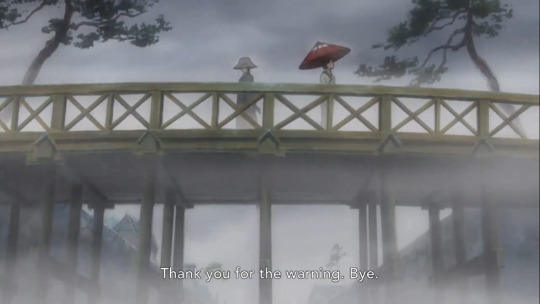
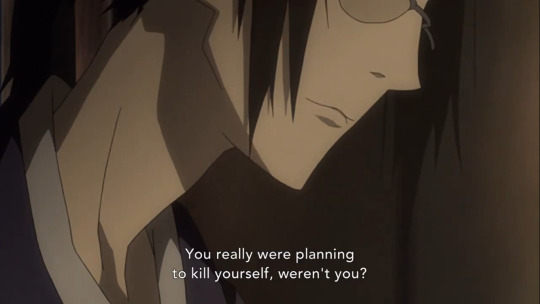
Never did Shino ever show any indication she wanted to drown herself, other than looking at the canal. Jin just knew the moment he walked by.
Mugen meets Fuu in the tea house and saves her life. The magistrate's son was going to have her mutilated and killed. But because Mugen talked with her, she was able to strike a deal of killing them for 100 dumplings.
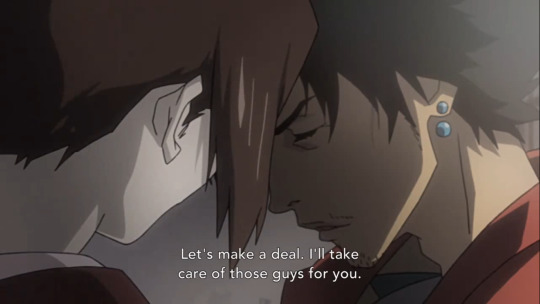
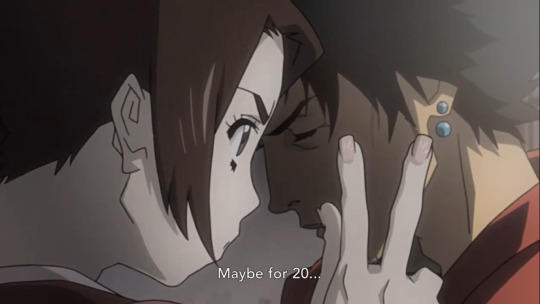
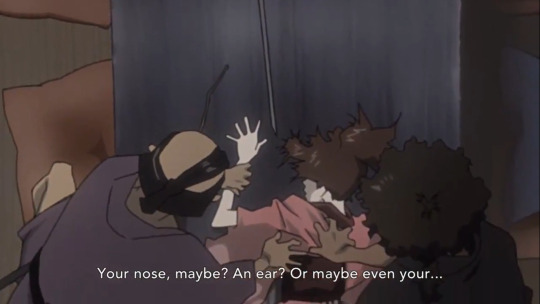

Never did Fuu tell Mugen that the guys were giving her trouble. Mugen just knew the moment he walked in.
In addition to this first meeting, Jin also stops Shino’s husband from beating her. Mugen also stops Umanousuke from beating Fuu in Episode 25.
Thinking in the Rain: Love Interest Trapped in a Brothel
Previously, in Episodes 3+4, Fuu was thrown into a brothel, just like Shino's predicament in episode 11.
After Mugen skips town and ditches the Yakuza, the thought of Fuu stuck in the brothel invades his mind, and compels him to turn back.
Note: Jin never thinks about Fuu stuck in the brothel.
After being unable to afford Shino, Jin is beaten by bouncers and trudges away, thinking about how Shino is sleeping with another man.
Both of these incidences occur during heavy rain.
Both think about their love interests trapped in the brothel which leads them to return to save them.




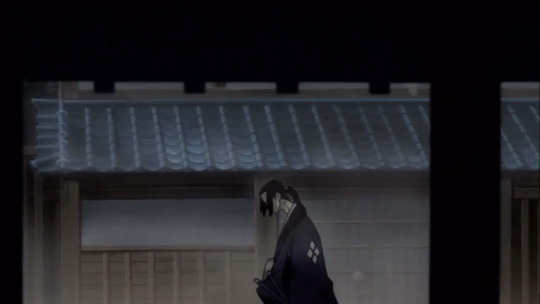
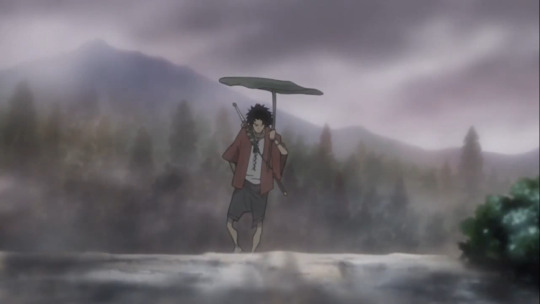
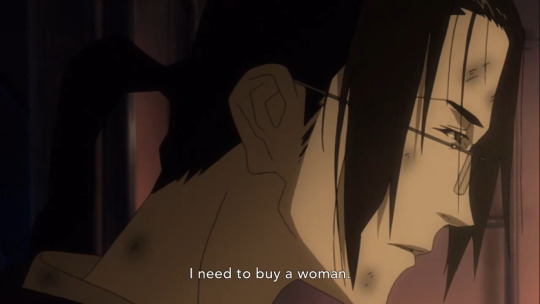

The Brothel Escape.
Both Mugen and Jin attempt to break their love interests out of a brothel.
On the second night they spend together, Jin concocts a plan to sneak Shino out of the brothel.
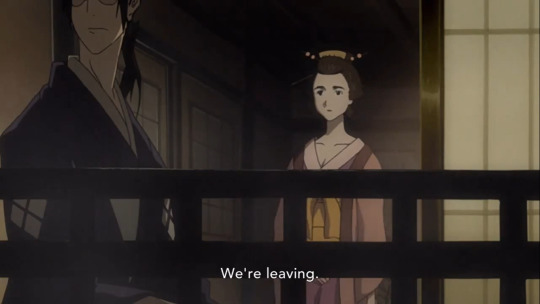

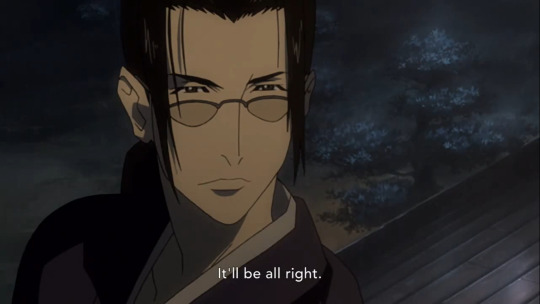

Never one to be discrete, Mugen’s plan to save Fuu involves breaking into the brothel, kicking open the cage doors, and pulling her out. However, to keep the MugenxFuu romance subtle and to have shippers rip their hair out Fuu escapes alone, and she never finds out about Mugen’s wild attempt to get her back. So, we never get the obviously romantic scene of him grabbing her arm and whisking her away. We just know that poor Mugen tried.


There is evident blood on his sword. He killed a person or multiple people to get back to her.
Mugen could have taken and freed any of these lovely ladies. But no.

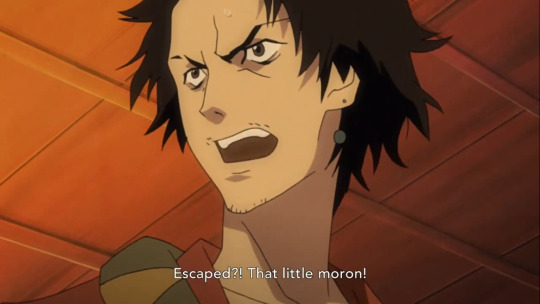
Note: Jin is seen putting no effort into saving Fuu at all. When Jin initially sneaks into the brothel of Episode 3+4 disguised as a woman, he had no idea Fuu was there at the time. He was just helping the boy Sousuke save Osuzu. Later, even when he sees Fuu there, Jin never is shown putting in any effort to rescue her, nor thinking about it. If we assume he intended to, with his roundabout way of being involved with the Kawara gang, (who he was already helping anyway), Fuu would have already been bought by a client, because she was. (luckily the client did not have sex with her).
If this isn't enough of a mirror, Fuu and Shino escape the brothel in the exact same way: tying a series of clothes to the porch and sliding out the window.
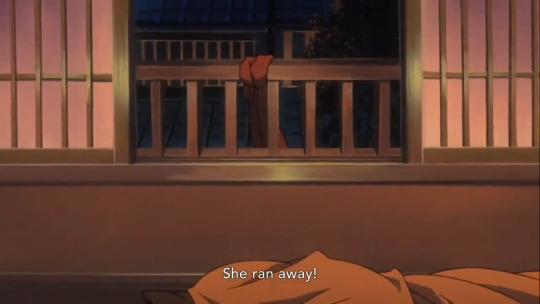
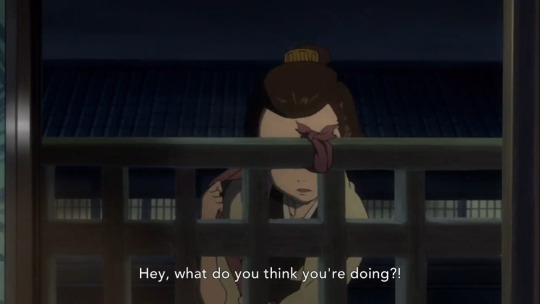
Giving Up One’s Sword For a Woman
Shown in both episodes 6 and 8, Jin is extremely protective of his katana, saying that his swords are the equivalent of his soul as a samurai.
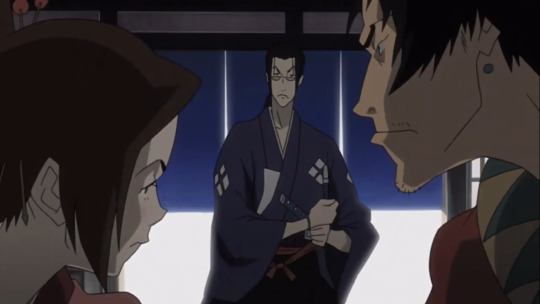
He adamantly refuses to part with them for any reason. He is also shown in episodes 14, 16 and 20 diligently polishing them.
On a different note, Mugen is not shown taking care of his swords as meticulously as Jin, nor as protectively. He is willing to pawn them off if it means being able to eat: shown in episode 6 and episode 8.
But his sword is no less important to Mugen, as he is shown carrying the same sai handled tsurugi in his flashbacks in the Ryukyuan Islands, implying he had carried it for a long time. For Mugen, the sword has nothing to do with some code of bushido, or philosophy. It serves the fundamental purpose of keeping him alive, which is something Mugen constantly struggles with.
In a brothel, swords are not allowed, as it is unsafe for the courtesans if there happened to be a violent client.
In Episode 25, Umanousuke is about to kill Fuu when Mugen arrives.
To spend time with Shino and free her, Jin willingly gives up his swords.


To save Fuu’s life and free her, Mugen gives up his sword in Episode 25.
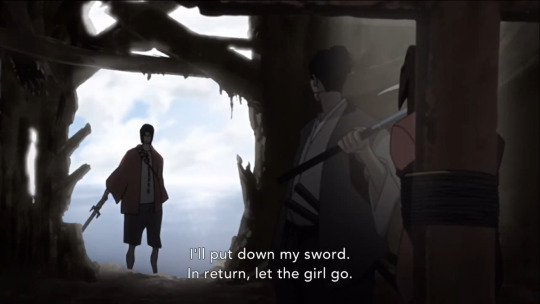
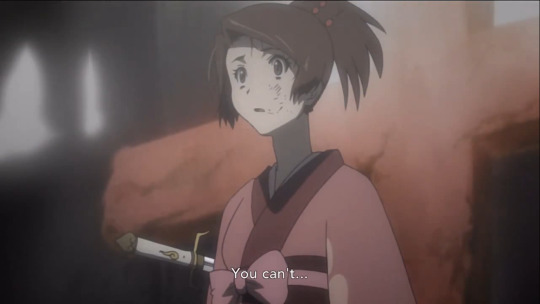
Note: The only other example we have of Jin “giving up his swords” is comedy when Mugen and Fuu confiscates his swords against his will, so they can enter an eating contest in Episode 6.
Interestingly, the two men gave up their swords under reversed circumstances, yet with the same intentions.
Jin, who has always cherished his katana, ends up giving them up in a moment that he logically "shouldn't". He does what could be considered a frivolous activity of spending time with a prostitute, which completely goes against his personal code as a samurai.
Mugen, who had always been willing to give up his sword for the sake of survival, finally needs to keep his sword, or he will be brutally tortured and killed by Umanousuke. But instead, he gives it up anyway in this extremely critical moment, to save Fuu's life.
In the end, both men resorted to giving up their swords for one simple reason: love.
Red and Pink Color Composition
This one was very surprising for me, and the reason I ended up writing this entire post. The other examples until now are more obvious. But this? Mugen and Fuu's main colors are obviously red and pink. But...Jin and Shino?
Shino’s kimono color is light green, with a dark green collar. Jin’s color is dark blue.
However, when Shino is put in the brothel and takes on the name “Kohana”, she is seen throughout the majority of the episode wearing pink, with a burgundy collar. This is exactly Fuu’s kimono colors, and no other character in the series wears these colors that I can recall.
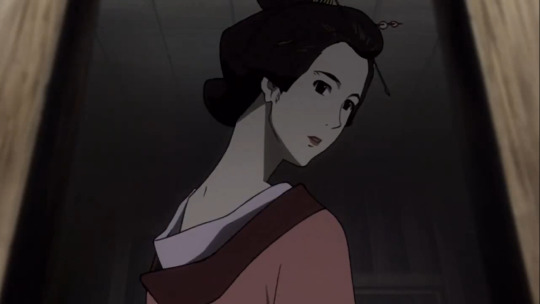
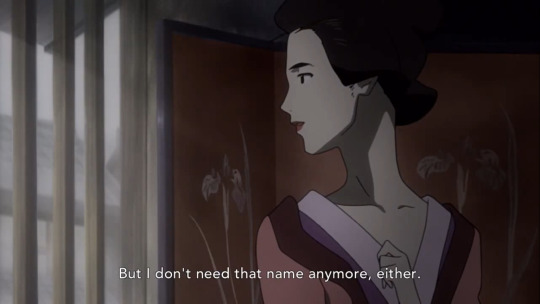
More interesting, is Shino’s brothel name becomes “Kohana”.
Kohana means “Flower Child”.
Fuu is the child of the “Sunflower Samurai”.
For the first time, I was suddenly faced with a serious question of "Was this name choice and kimono color put as a symbolism of Jin choosing to buy a woman that resembled Fuu?" And in turn, would this be one solid way to disprove so much that I've always thought and written about Jin being the father figure to Fuu?
But, then I noticed something else.
Shino only wears this pink and burgundy kimono in the brothel. It is not her true outfit.
And it is not only her who gets a "change" in appearance. Jin does too, in a sense. He gets an addition to his ensemble, only for this particular episode.
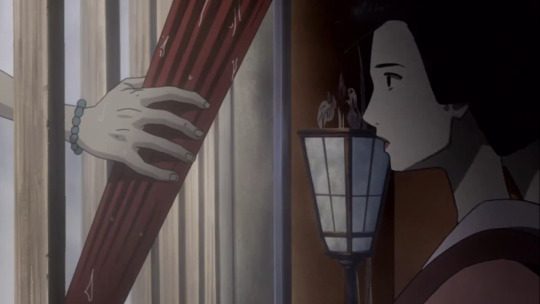

Every time Jin visits Shino in pink, he carries a bright red umbrella. Whenever she is in green, he does not have the umbrella. He visits her on four separate occasions when she’s a courtesan, always with the umbrella in tow.
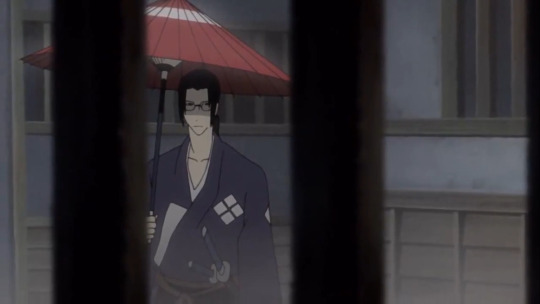
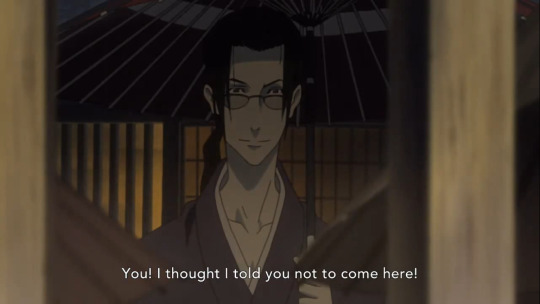

The red umbrella is visually striking, as the atmosphere of this episode is particularly drab due to the rainfall.
The red umbrella becomes the connection between Jin and Shino during her stay in the brothel. It is significant, because it was initially hers, and was a gift to him since she had no use for it in the brothel anymore.
One can argue, “It’s raining and he just needed an umbrella.” But during his depressing walk, he carries it, but doesn't even use it, and we don’t even get to see it or its striking red color. (Which I will explain my interpretation as to why shortly).

We only know he’s holding it, because he continues to have it afterwards.
It is far more a symbol of his connection to her, than for practical use. Watching the episode, everyone else has drab brown and gray umbrellas. Even in Episode 4, Jin donned a drab brown umbrella.
In Japanese culture, red is famously the color that represents the “main character”. This is extremely common in many anime and video games, and particularly shown in the Super Sentai genre, in which every season since 1975 to present, the main character always dons red.
In the case of Samurai Champloo as well, Mugen is confirmed to be the “main character”, first developed by Shinichiro Watanabe, with Jin created later as his foil so the story did not become “one dimensional”, as he said. This is why most episodes focus on Mugen.
Episode 11 is the very first episode that focuses on Jin. Up until this point, Jin was never a rescuer. (He doesn’t even rescue Fuu until Episode 26).
With Shino, he finally fulfills the "noble hero saving the maiden" role.
More interesting, is the scene where the brothel bouncers attack Jin, who intentionally decides not to fight back. Jin loses his grip on the umbrella. This is my personal interpretation, but I think this could be a representation that Jin could not protect Shino, as she is forced to have sex moments later.
If it were Mugen being attacked, he would kill the men, repercussions or not, just as he did to the Yakuza in Episode 4. Mugen will always embody the “passionate red” that he wears.
But it does not suit Jin. He has chosen the lawful path, unlike Mugen’s chaotic nature of killing whoever stands in his way. Jin does not kill these men, since he has no reasonable cause, and does not risk the repercussions. It is his own fault, not theirs, that he can’t purchase or protect Shino.
In this scene, he not only drops the red umbrella, but Shino also drops her pink robes when she is undressed. They are not red and pink: they are not Mugen and Fuu. They are back to the cruel reality of being a different, more tragic tale of love in which he can’t protect her.
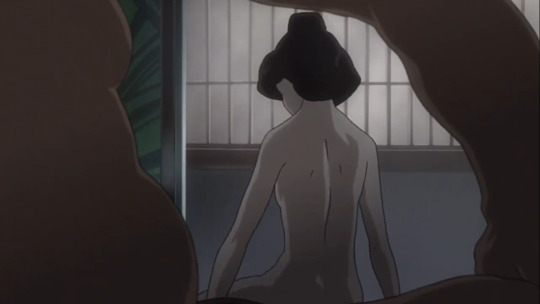

One of the attackers even picks up the umbrella, and throws it at him, as if to add more injury to insult in his failure.
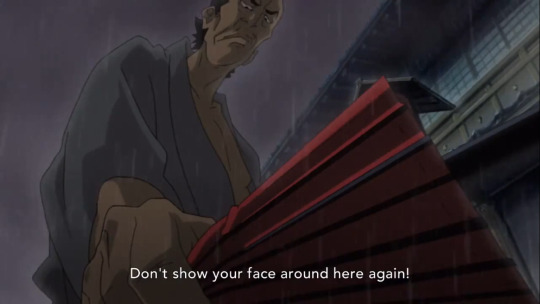
In the ending of the episode, Shino no longer wears pink and burgundy, and is back in her original green kimono. Interestingly, Jin stops using this red umbrella at the exact same point she is back in green.
Since Shino is no longer a “maiden in distress in pink”, Jin no longer needs to be the “hero in red”. They no longer have to play this role. Their episode is at its close. The anime will return to Mugen and Fuu carrying out the dynamic of “hero and maiden”.
Jin will once again, play the role as the cool and collected “rival in blue” that foils the main protagonist.
One could still argue these color choices of red and pink were random and thoughtless. They very well could be. But, this is a Watanabe work, and colors often hold surprising symbolism in the anime he directs.
As a more solid example of color symbolism: here is a link to a fascinating video that reveals just how intentional the color palette is in Samurai Champloo's Episode 14. The choice of Mukuro's yellow versus Mugen's red and the episode ending on Koza in gray was all deliberate and was repeatedly shown in the episode's composition through various means, to subtly convey the story.
Flashing the Coin and “Buying”a Woman
Jin is shown to be the character who makes/finds money for the group the most. Even in this episode, he was working for the eel stand. Mugen meanwhile, makes money and spends it selfishly. But in this episode, it is Mugen making the money and Jin demanding it for a selfish purpose, reversing their roles once again. Jin is the main character now, and Mugen the foil.
Mugen flaunts the coin he made to impress Fuu, demanding her validation by tapping her head.

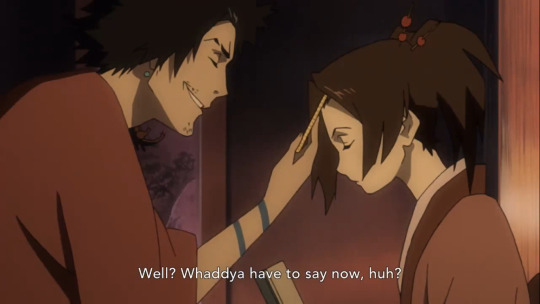
Jin flaunts the same exact coin (Mugen gave it to him), in a very similar way, to show he’s buying Shino.


Both men, in essence, are "buying time with a woman".
While Jin is, in a literal sense, using the money to purchase a prostitute, Mugen's is more figurative.
Mugen gives the money to Jin, causing him to go away, and leaving him and Fuu alone. Once Jin is back, they will once again be a trio, and the “pairing dynamic” between them will be shattered. But for that brief night, Mugen got time with Fuu.
Mugen, despite acting like he detests Fuu's company, does some very strange and completely uncharacteristic things in this episode. For one...he is the one to bring Fuu to the beetle wrestling match. Her dialogue implies she didn't want to go and Mugen dragged her along.

Then, despite being all stingy about the money with Fuu, he willingly gives the money to Jin to send him away to go to a brothel. For a man Mugen claims to despise, this is a remarkably thoughtful act. Especially when he said he was going to use the money to buy seeds to make more in beetle wrestling. Strangest of all, Mugen doesn't use the money himself for a prostitute. He chooses to stay at an inn, alone with Fuu, rather than the prospect of going to the brothel in town, even when he’s repeatedly shown being a womanizer.
I think this act shows both his selfish desire to spend time with Fuu alone, but also his selfless care for Jin as a friend. He killed two birds with one stone. In both cases, these are things Mugen would never admit to his companions.
With the exchange of that on koban coin between them, both Mugen and Jin have "bought time" with their respective love interests.
Helping to Save Each Other's Love Interest.
In every episode Fuu gets into trouble, Mugen is the one who saves Fuu, if she isn’t saving herself. Jin does not. But there is one exception to this: Episode 26. Jin saves Fuu for the first time, in the one moment Mugen can't, while also simultaneously avenging his father figure Mariya Enshirou.
In episode 11, Jin does not have his swords on him. But Mugen and Fuu arrive. Mugen cuts down many men to help them escape. And in addition, he knocks down a man right in front of Shino that Jin failed to incapacitate, before telling Jin “You’re pathetic!”
The Windowsill and the Mirror in the Same Room
This one is a very, VERY minor comparison, so don’t take this one seriously. I just thought the imagery was similar.
In Episode 18, where Mugen attempts to win Fuu in a tagging contest (yes, that was actually the plot: Here's a Post About It), Mugen and Fuu spend a small moment in the inn room alone.
In this inn room, Fuu is looking at herself in the mirror, when Mugen appears behind her.

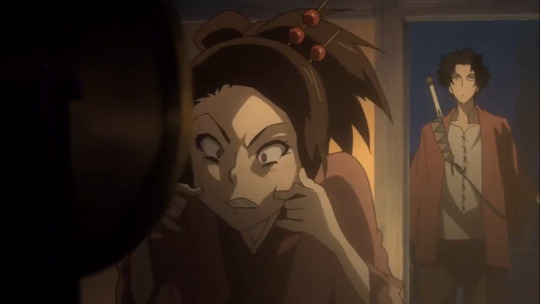
Their faces are wonderful.
In the brothel room, Shino also looks in the mirror, when Jin is shown behind her.
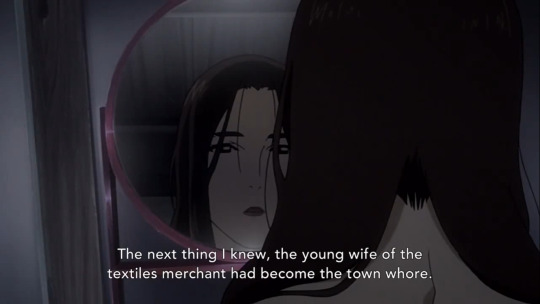
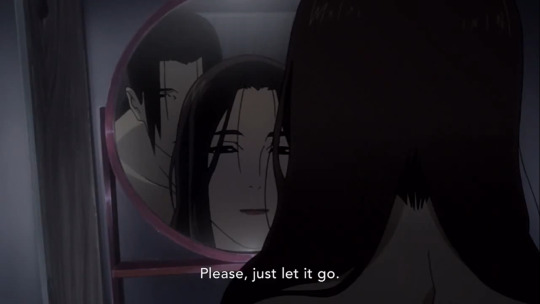
Alone with their love interests, they sit on windowsills.

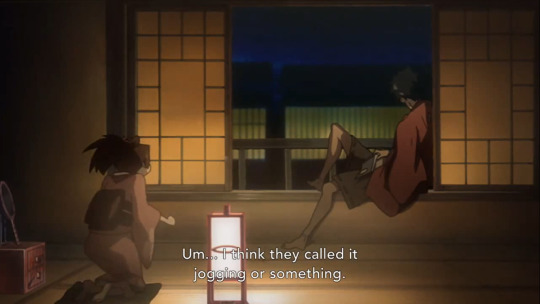
Again, very, very minor and I highly doubt it was intentional. But there is no other moment of window sill sitting that I can recall.
There is one other gazing into a mirror though: the end credits of Fuu and her mother. This relates her mother to Shino, aside from the fact that they have the same exact hair and wear green kimonos, and who are in love with a poor samurai who ends up wearing gray.
Parting Ways
In the defining moment of Jin and Shino parting, there is a distance of water separating them. But Jin must let her go to the temple to be free of the marriage: her final goal.
In the defining moment of Mugen and Fuu parting, a distance of the Church with Umanousuke is in the way, separating them. But Mugen tells her to go see her Sunflower Samurai: her final goal.
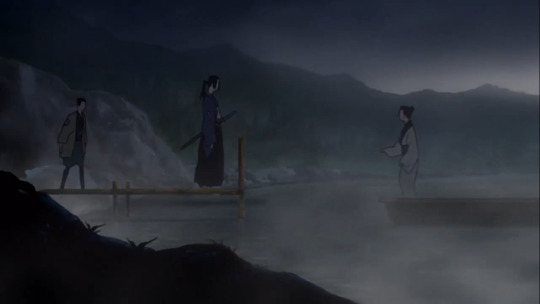

Neither Jin and Shino or Mugen and Fuu are allowed to touch or to embrace before this forced goodbye.
Jin is the one to push the boat away, even when Shino tries to reach out to him.
Mugen is the one who urges Fuu to run, even when Fuu hesitates and wants to stay.
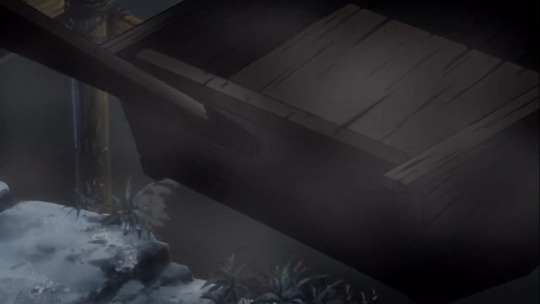

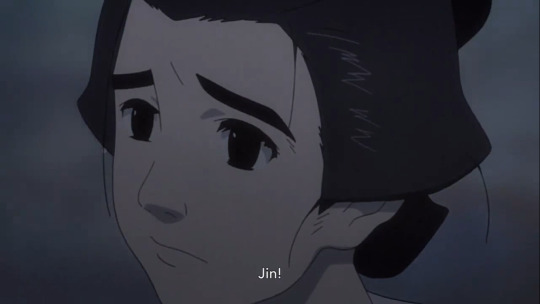

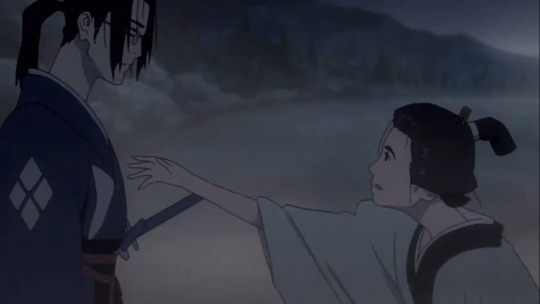
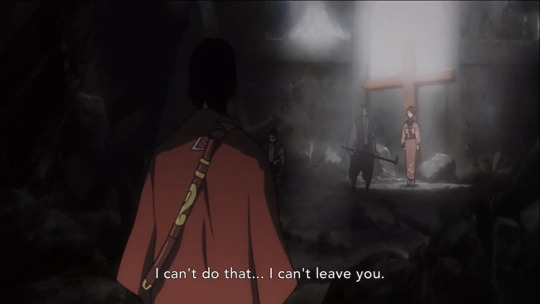
Both Shino and Fuu are reluctant to leave Jin and Mugen behind.
Mugen and Jin remain stoic, even when their emotions must be running wild.
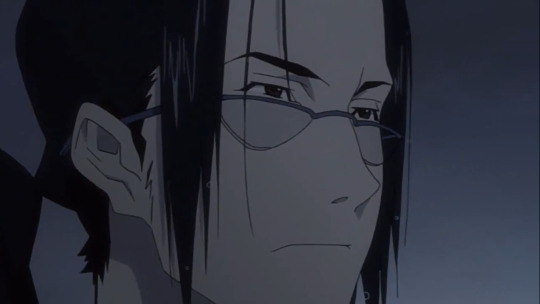

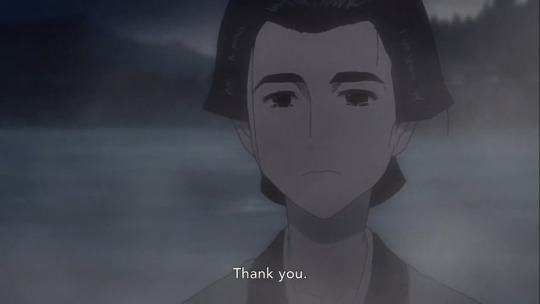
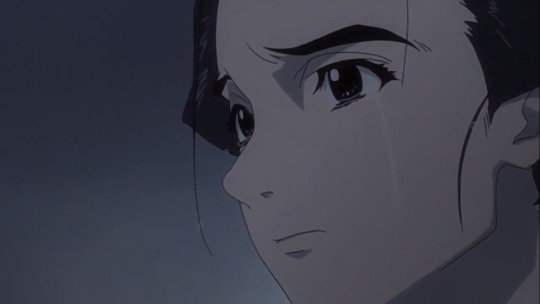
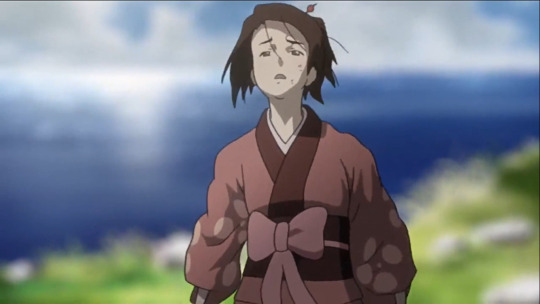
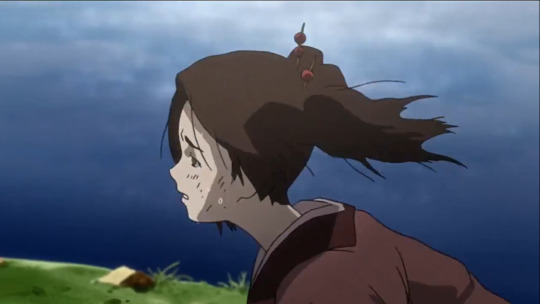
Fuu and Shino’s eyes well up, until they are unable to hold in the tears.
“The Love Triangle” Dilemma: A Lousy Gambler, A Noble Samurai and a Pure Maiden
Now, I am not saying that Mugen, Fuu and Jin is an actual love triangle. I firmly believe it isn't, as I have shown the evidence of the two romances above.
But I believe in Mugen's mind, there is a love triangle, and he’s the odd one out.
Yes, there is a sense that Fuu has insecurity about Jin's abandonment and is jealous of his attention to Shino. Personally though, I think this is in more relation to her father's abandonment, as Jin and Shino strikingly resemble Fuu's father and mother. Jin even gets Fuu’s father’s kimono in Episode 26, and likely his katana too, as his were broken.
But that aside, the relationship dynamics going on in Episode 11 are painfully satirical.
Shino, her husband, and Jin are an ugly representation of Fuu, Mugen, and Jin.
Jin is interfering with both of these "couples".
Shino's husband is an avid gambler, who fell into debt, causing her to be thrown into prostitution. It is no coincidence that Mugen is avidly gambling throughout this episode, and being chastised by Fuu.
Fuu’s words to Mugen are Shino’s words to her husband.
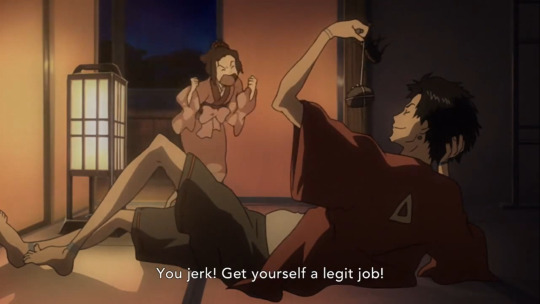

Mugen is being portrayed as the "lesser man", lacking in morals, while Jin takes on the mantle of the “gallant knight”. This again relates to the earlier concept that Jin has for the first time assumed the position as the “main character”.
This is likely why they chose “Gamblers and Gallantry” as the English title for Episode 11. Note that Gamblers is plural. (Also, the original Japanese title is Fallen Angel).
Fuu’s “jealousy” in this episode is used in the narrative to make Mugen believe she loves Jin, and not him. We see this again, in Episode 20. The one and only time Fuu cries for Jin is comical, compared to her over five emotional times for Mugen, still causes Mugen to stomp off with jealousy and annoyance.
Our first indicator of Mugen harboring jealousy of Jin stems from Episode 11 and piles up more as the show goes on.
There is three separate implied occasions in this specific episode 11.
1. Mugen states that Fuu is jealous that Jin is seeing Shino. But when he says this, it is him to roll over away from her. It is almost a blatant indicator that he is sulking. Then, he feigns sleeping and snoring.
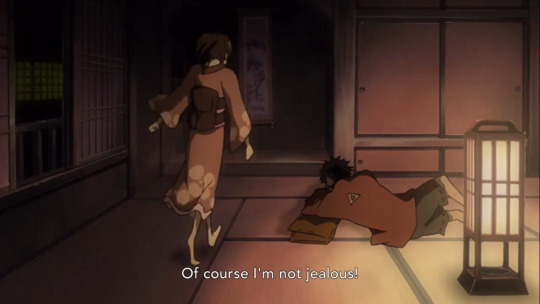
We know his sleeping is fake because upon closer inspection....
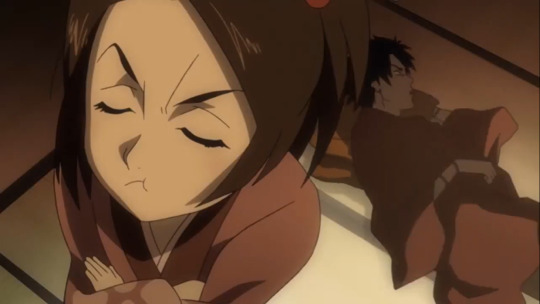
His eyes are open and his eyebrows are furled angrily. This “faking sleep” is a trick he repeats three times total in the anime, always concerning Jin and Fuu.
2. When Fuu gets upset at Jin about leaving the group for good, Mugen pretends to sleep yet again, but was listening to the whole thing.
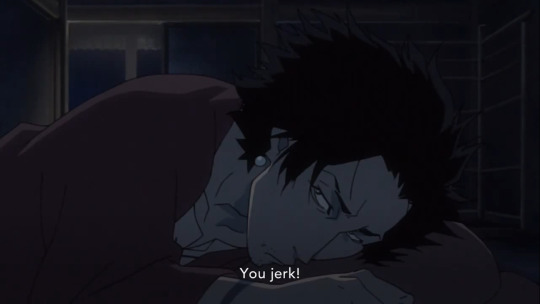
His facial expression is almost sad looking here. Very uncharacteristic indeed.
Note: The very last time Mugen pretends to sleep, is Episode 24, when Fuu hugs Jin on the riverbank. It appears here, that Mugen didn't hear or understand what they were talking quietly about. The dialogue is hard to interpret but it seems Fuu rejected Jin’s dutiful offer to stay with her after the journey close. She seems to confide her feelings for Mugen to Jin in this extremely subtle scene, by mentioning him out of the blue, crying, and then apologizing to Jin for it. Rather than embrace Fuu romantically, Jin comforts her with a hand upon her shoulder, in an understanding that is, by my interpretation, very fatherly.

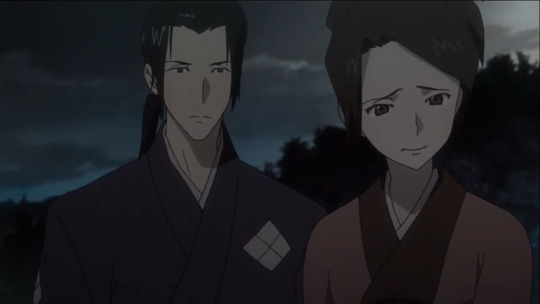
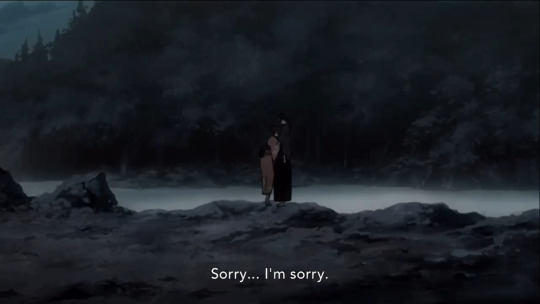



3. Back to Episode 11, when Fuu decides to help Jin, despite being angry at him for abandoning them, Mugen says some telling dialogue. This scene, Mugen and Fuu are running through town together, just as Jin and Shino are.
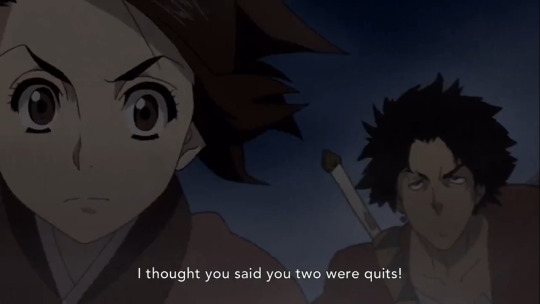
If Mugen only stuck around solely to kill Jin, then this exchange makes one question why is he still hanging around Fuu. We also know Mugen was listening the whole time when Jin states "If I don’t return, I want you two to continue your journey without me." It is as if he's trying to convince Fuu to be "over" with Jin.
But this isn't the only time Mugen is fine with taking Fuu to find the sunflower samurai alone. Mugen also agrees to travel with Fuu in ep 21 alone, when they think Jin is leaving for good with Sara, and makes no indication of leaving her to do battle with Jin.
Despite all the jealousy of Jin, and all the intentional comparison that Mugen bears with Shino's husband, we know Mugen is not actually like Shino's husband at all.
On the surface, perhaps, he seemed like an irresponsible, lawless lecher who frivolously wastes money. But in actuality, he is honorable and deeply cares about Fuu, saving her and worrying about her in every single episode something bad befalls her.. Mugen does more noble deeds for Fuu than Jin ever does.
While “Gamblers” apply to Mugen and Shino’s husband, the “Gallantry” applies to Mugen and Jin just as much.
That is why, unlike Shino’s husband, Mugen wins in gambling. And that is why, despite making money gambling, he generously gave it all to Jin.
The secretly gallant character of this episode was Mugen. Had he not given/borrowed this money to Jin, Jin would have never been able to save Shino at all.
How the Relationships Differ
While these comparisons highlight that Jin and Shino is equivalent to Mugen and Fuu, there are some directly opposite characteristics as well. Just as Mugen and Jin are opposite.
Jin and Shino are calm and quiet. Mugen and Fuu are passionate and loud.
Jin and Shino wear cold colors of green and blue, while Mugen and Fuu don warm colors of red and pink.
Shino is older than Jin. Fuu is younger than Mugen.
While Shino is forced to give herself to men and Jin can’t save her, Fuu is saved from this fate many times by Mugen.
Mugen and Fuu spend an entire, long journey together. Jin and Shino’s time together is fleeting. Mugen and Fuu appear together every episode. Jin and Shino only get one.
Ironically, Jin and Shino consummate their love in this short time, while Mugen and Fuu do not.
The relationships are remarkably the same story but from opposite ends of a spectrum.
Conclusion
Mugen and Jin may be opposites, but they are also like Yin and Yang. Both characters are a duality of one another, possessing opposite traits in their appearances and attitudes, and yet bearing similar beliefs and morals. In the love department, it turns out that they are also two sides of the very same coin.

After discovering the parallels between these two romances, I was utterly blown away. This concept of duality is the entire point of Mugen and Jin’s dynamic in every other sense.
The love they bore for Fuu and Shino highlighted this concept in another new, astonishing way.
Mugen and Jin both bear something else in common. Even though Jin and Shino is far more an obvious romance due to the sexual consummation of the coupling, Jin and Mugen still relate in one way: they never directly express their love for Shino or Fuu words.
Jin comes off as “old fashioned” with his “I hope that the rain will never stop so I can stay here forever.”, Mugen comes off as “unromantic” by never saying kind and romantic words to Fuu. Their love was wholly expressed through action. Words are unneeded.
Finally, even though Jin and Shino part ways, and even though Mugen and Fuu (and Jin) part in the finale, hope still exists that they will meet again someday.
Both tales of love do not have tragic endings, but neither does either obtain closure. Their hopeful future is left up to you, the viewer, to determine.
Perhaps, their reunions with their loved one, will be a mirror too.

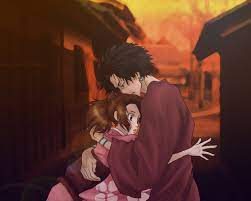
342 notes
·
View notes
Note
*chants* E, K, R, Z
E - Have you added anything cracky/hilarious to your fandom? If so, what?
I didn’t create this cracky/hilarious thing, but I think I inspired it! And then you took the idea and ran with it, you utter genius.
I wrote this VERY REAL CONVERSATION Rob Thomas had with his writers while writing Mr. Kiss and Tell. (My tags on this post make sad AND lol at the same time: #can you tell i just finished mr. kiss and tell #mkat spoilers #book: mr. kiss and tell #rob thomas #i might be done w/ new canon #i don't trust this dude - HOW RIGHT YOU WERE, 2015 SUZANNE).
And then here I processed my reaction to the L/V ATTB scene in the movie via Monsters Inc. gifs, as one does.
K - What character has your favorite development arc/the best development arc?
I already talked about our boy Logan Echolls here, so let me take this chance to mention our other boy, Chidi Anagonye.
I think that Mike Schur’s way of doing character arcs/development is so interesting because rarely do the arcs of his characters go from “person never cared about anything!” to “person cares about things!” I guess, perhaps, that’s Eleanor’s character arc but I think hers is actually a little more complicated (though that’s a subject for a different time).
No, what Mike Schur does really well is move a person from “person cares about things in a way that prevents them from getting the things they want!” to “person cares about things in a way that is more in line with who they are as a person!” And I think that arc is very well done with Chidi.
R - Which friendship/platonic relationship is your favorite in fandom?
There are so very many but here are a few with one thing I like about them!
Leslie Knope and Ann Perkins from Parks and Recreation - I love how they’re basically the adult equivalent of two five-year olds sharing snacks out of their lunch boxes and being like “I don’t know anything about you, but we’re best friends now.” Very sweet. Very funny. 10/10.
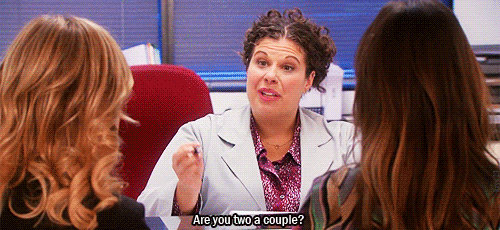
Pam Beesley and Dwight Schrute from The Office - I haven’t rewatched The Office in a hot minute, but I do remember that the first episode that we really see the Dwight/Pam friendship is an utter delight to me, and the little snapshots we get into their dynamic are such a true highlight.
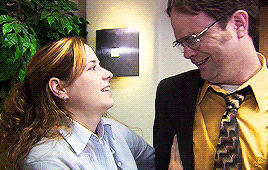
Michael Cordero and Rogelio de la Vega from Jane the Virgin - There were many issues I had with the later seasons of JTV (which is in large part why I stopped watching it), but my love for these two knuckleheads is unparalleled. They make me laugh, they make me smile, they make me wish for a Michael/Rogelio spinoff show. (Also, one of the big failures for what they did is that when they brought Michael back, THEY DID NOT HAVE HIM INTERACT MEANINGFULLY WITH ROGELIO. HE NAMED HIS DAUGHTER AFTER MICHAEL. I MEAN....)

Alexis Rose and David Rose from Schitt’s Creek - This is hands down the best sibling relationship I have ever seen on television. Would watch the reality show where the two of them travel across the country in a Drivers, Diners, and Dives type show.
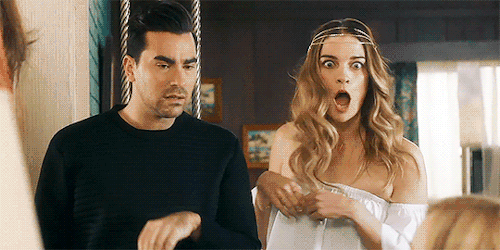
Z - Just ramble about something fan-related, go go go! (Prompts optional but encouraged.)
I am having all sorts of thoughts, opinions, and feelings about what happens to character relationships when they transition from best-buddies with a will they/won’t they dynamic to a romantic couple. Specifically how the show dramatically changes the nature of their relationship, often in a way that is so ... lackluster? unsatisfying? disappointing?
Couples with this unsatisfying shift, in my opinion, include Nick/Jess (New Girl), Jonah/Amy (Superstore, I presume...I am pretty early into the season but I’ve noticed a shift), Luke/Lorelai (Gilmore Girls, not to mention all of Rory’s relationships and maybe even Sookie/Jackson to a certain degree), Mindy/Danny (The Mindy Project), J.D./Elliott (Scrubs).
I think what happens is that the elements of a good flirting/pining/will-they-won’t-they dynamic rarely carry over into the romantic relationship. And, if they do, they are immediately given this emotional heft to them that take a lot of the fun out. How many couples in the will-they-won’t-they stage have an episode or multiple episodes where they’re very distracted from their real life commitments goofing off, or hanging out with the person they’re pining for? Once they get together, those episodes somehow no longer exist. As if...once a couple gets together they stop flirting? stop wanting to spend time together? stop wanting to go on stupid dumb adventures and be their utterly dorky selves?
For example, if in their pre-relationship phase person A routinely made fun of person B’s clothes, and made them go shopping, and person B grumbled about it the whole time but secretly loved the attention - once they start dating if that exact scenario were to happen, it would be much more likely that person B would not love the attention. The show would be much more likely to have person B conclude that person A wants to change them, and won’t accept them for who they are. Basically, even in shows where the couples stay together post will-they-won’t they, fun is ultimately cashed in for commitment. “These two people don’t flirt anymore because they’re together!” these shows say. “Remember in their will-they-won’t they phase how every almost kiss and kiss had this tension and catharsis and passion? Now that they’re together kissing is obligatory and doesn’t matter and is DUMB!”
What is this? What are these writers relationships like? Why can’t couples keep flirting once they’re committed? Why can couples only see their partner as the one they confide in when they’re not together? MAKE IT MAKE SENSE!
(And then there’s the exceptions, those couples who I believe maintain a key element of their dynamic upon getting together. These couples include Ben/Leslie (Parks and Recreation), April/Andy (again Parks and Recreation), Jake/Amy (Brooklyn Nine-Nine), Jim/Pam (The Office), Janet/Jason (The Good Place) and yes I am demonstrating my huge Mike Schur bias - I AM AWARE!)
3 notes
·
View notes
Text
About Roslin and Baltar’s trial
I’ve been thinking about Roslin’s reasons behind putting Baltar on trial, because I’ve seen many different opinions on that and whether she was right or wrong. The show itself suggests a few times that she’s doing it for revenge, while her fans are taking her side. I think as always on BSG, the truth is more complicated than that.
To preface this, I am in the unique position because I am a big fan of both characters. Roslin is my favourite female character and Baltar is my favourite male character on the show. Watching their separate stories is so much fun to me and when they have scenes together is always a special delight. I love seeing how their paths cross, how they run in parallel, how they are foils to each other, everything about them is interesting. There is a symmetry to them as they exchange their roles in the show which I deeply enjoy and appreciate. They’re both very human characters, flawed, imperfect, but striving to be better. I don’t see Roslin as some paragon of virtue because she’s clearly not and never was. She made too many awful decisions for that, but she’s made quite a lot of good calls too. A lot of her ruthlessness comes from a sense of vulnerability. She can’t afford to show kindness or mercy to the enemy and potential threats have to be dealt with or the humankind won’t survive. That’s her M.O. She’s an iron lady, not some bleeding heart of a naive schoolteacher.
Season 3 of the show is all about New Caprica. Even when the characters are lightyears away from that planet, they still carry it and what happened there in their hearts. New Caprica tainted them all and left wounds they all spent the rest of the season healing. But there is one wound left for the last - Gaius Baltar. He is the symbol of New Caprica. He gave people the promised land but it turned into a living nightmare. He was a shitty president even before the Cylons came, so it was easy to place all the blame for NC squarely on his shoulders. However, it wasn’t as if he was voted in and people followed him there, rather it was the other way around - people wanted to go to NC, so they voted for him. People trusted Baltar because he was a genius scientist, because he claimed he cared, because he was an attractive political alternative to Roslin. Humanity made a bad choice, but it is easier for them to erase the physical reminder of that mistake than admit to it. Hence the ubiquitous hatred for Baltar in the Fleet.
But Roslin’s not just an average citizen, she’s much closer to Baltar. Of course she regrets not going through with stealing the election. She had a chance to prevent all this tragedy from happening and she didn’t. She chose the higher road in the end, to be the better person and she let Baltar win. Her own nobility doomed humanity. That’s a bitter pill to swallow. It must haunt her. And I think it certainly informs her ruthless decisions in S3, like ordering the Cylon genocide. NC taught her that morals can and should be sacrificed for the sake of survival. She doesn’t want to make that same mistake again.
S3 features a fascinating reversal of roles between Roslin and Baltar. It starts with him as the puppet president and her a powerless schoolteacher. Their first scene together is when he visits her in detention center where she’s held. The show never makes it clear whether Roslin was tortured and how (I suspect food and/or sleep deprivation), but she knows others were. Regardless, she is a victim of the occupation, unjustly imprisoned. Her name is on a death list, signed by Gaius Baltar.
There are many things Laura Roslin is and I believe that one of those is vengeful. She remembers everything good or bad, and she also holds grudges. One of those grudges is for Cylons who she has a certain propensity to airlock. Not unfounded of course. That combined with her regret for not stealing the election and her belief that Baltar is a traitor and traitors should be killed is a deadly combination for Gaius.
The graphic demonstration of Roslin’s grudge against Baltar is the entire episode 3x13 Taking a Break from All Your Worries. The tables have turned, the reversal of roles is complete, but what’s done is the same thing. Roslin’s doing to Baltar what was done to her. From the very beginning of the episode we have Baltar in prison, making the noose. It’s night but the guard wakes him up when he nods off. That’s the start of torture - sleep deprivation. Then Roslin’s first visit to his cell is a purposeful replication of his visit to her cell on NC. Through the episode, she continues with various methods of torture, to interrogate him and get the admission of guilt that she so desperately wants from him - which will justify what is done to him illegally. Which will validate her despicable actions against him, because he would admit to actually deserve them. But just like Roslin did not give Gaius the information or cooperation he wanted on New Caprica, Gaius doesn’t give in to her brutal methods here. Another similarity between them is that he didn’t wish her to suffer on NC and her crying when she has him tortured. Torture horrifies both of them and I think for Roslin that was a moment when she became horrified at herself and what she was doing. No Cylon was making her do this. Her conscience woke up and it couldn’t be silenced. (Still, Gaeta got only a slap on the wrist for murder attempt on the prisoner. Interesting how Roslin’s justice works when she can better empathize with Gaeta for wanting to kill Baltar, than with Gaius who she’s deliberately putting through the exact same things she’s personally gone through. As if she can transfer her own horrors to him and finally be free of NC.)
The last on her list of things to reenact is the death warrant. Adama offers to have Gaius quietly disappeared, just like Roslin was supposed to be killed back on NC. Out of sight, out of mind. But Roslin decides to give Baltar the trial for several reasons. I think the most important one is that she wants him dead for being a traitor but she also wants the moral high ground. His torture already made her too close to being like the enemy. When Baltar is tried and found guilty - and in her belief he cannot not be found guilty - he will be legally sentenced. She will not have his blood on her hands. She will not kill him just because she has the power and means to, not as a whimsy of the President. He has to be objectively judged and sentenced to death that he deserves for his own actions. Roslin fully believes her own judgment of Baltar is correct and objective. She refuses to acknowledge her own subjectivity when it concerns him. That’s why she allows the trial - because she is convinced it will go the way she wants it and Baltar will be sentenced to death. The last factor of why she decides to put him on trial is that she’s wanted to do this since she learned about his involvement with Six before the attack. She couldn’t have done it before because the only proof she had was a memory that resurfaced when she was dying and heavily medicated. It would’ve been just her word against his. But occupation of NC gives her all the reason and proof to finally convict him for his crimes. It’s tangible, real, it didn’t happen only to her. Everyone was there, everyone suffered. She has the public with her on this.
As an aside, it’s pretty hypocritical that Zarek gets away scot free. The man was the political mastermind behind Baltar’s presidential campaign, but because he got lucky and Cylons didn’t shoot him when he refused to cooperate and then he was with Roslin on the death list, he gets a free pass from her. A lot of help he was, rotting in a cell for the whole occupation. But now he’s her pal, he gave her back the presidential seat so all is cool between them. Even more hypocritical that Roslin banned Zarek’s secret tribunal killing collaborators right and left, but for Baltar she recreates it and makes it public for everyone to watch/listen to on radio.
It’s almost funny how Baltar makes Roslin lose her cool, how easily angry he can get her. She’s completely unobjective when it comes to him. He writes a book and she’s frothing mad. She imprisons a man because he read that book. She jokes about burning the book. She humiliates Baltar to make him stop writing, she lies to make him feel small, powerless, unheard. That’s how deep her grudge against him goes. If Adama is the equivalent of Zeus, Roslin fits the characteristics of Hera to a T.
One thing I really love about the show is that in the end, it doesn’t present the ideal solution to the issue of Baltar’s trial and punishment. I’d say that the actual message is that of mercy, but there’s no whitewashing his character. Baltar during and after the trial is shown at his smarmiest, but the justice is blind. It doesn’t care about likeability of the accused, it cares about evidence.
Was Roslin right or wrong? Was it right that Baltar was exonerated? What would be a just punishment for him? That’s left for the viewers to ponder about. In my opinion, the majority of S3 already showed Baltar’s punishment. Let’s not pretend that he was having a picnic when everyone else was suffering. He’s been imprisoned, horrifically tortured TWICE, he’s been almost killed multiple times, he tried to commit suicide. He had little to no control over his life, all he could do was to cling to it. His own guilt and self-loathing poisoned him and his love with Caprica Six. He’s lost everyone he cared for and became the most hated man in the universe. He was betrayed by Gaeta. And Baltar’s informal punishment isn’t going to go away just because he was freed by the court. Season 4 barely started and already someone attempted to murder him.
I spent hours writing this meta, so sorry if I rambled too much. I’ve just got a lot of feelings and opinions about the trial, Roslin and Gaius.
#bsg#laura roslin#gaius baltar#meta#3x13 taking a break from all your worries#3x19 crossroads part 1#3x20 crossroads part 2#3x16 dirty hands
27 notes
·
View notes
Note
Unpopular opinion here, but I don't like comic-Will because 95% of her character is just being jealous that Matt said "Hi" to another girl or something just as stupid as well as arcs 3 & 4 being dedicated to her getting mad at Matt while not listening not listening to his side of the story and trying to play the victim for the drama that she herself caused. Comic-Matt deserved better than whinny, bratty, comic-Will. But TV-Will & Matt? Yes♥ I totally ship it it's one of the things the show fixed
[Give me excuses to ramble about cartoon Will/Matt]
Oh goodness, anon, let me just say that this was a really really good prompt for me to dig into comics Will/Matt, to the point where I wrote like 1300 words about their relationship across the first seven issues alone. But we’re not going to get into that here because that deserves its own in-depth focus another time, and my passionate blathering about cartoon WxM got REALLY long.
To briefly address the comics, though: I agree that an inordinate amount of Will’s characterization went towards letting her emotions rule her actions, which impacted areas of her life even outside of Matt (most notably, her relationship with her mom). And you’d think that after the first time there’s a big blow-up from acting on her jealousy and possessiveness, Will would take a look at the consequences and learn from the experience. Jumping to conclusions and taking those misconceptions out on Matt and the other party involved only puts her own relationships with said people on the line; subtly gathering more substantial information or just flat-out asking what she wants to know is much less risky.
But that’s the problem: we get about three instances of Will’s jealousy rearing its head, damaging multiple relationships (mainly hers with Matt), and her sitting in the ruins stumped over what went wrong, all before the two of them are ever an official couple by issue #40. That’s like the equivalent of rehashing the same exact conflict between a will-they-won’t-they TV ship every damn season; even then, those types of narratives probably shake things up more than W.i.t.c.h. did with this ship’s issues (like maybe it’s the other half of the ship who’s dating someone else compared to the previous season). It’s annoying as hell, and frankly disrespectful to the characters because they never get a chance to learn from their mistakes and grow.
So I’m just going to caveat your original point: comics Matt and Will both deserved better. Matt (Original Recipe Matt, at least—New Power Matt is a different, unrelated, terrible story) should have had the opportunity to really think about his relationship with Will, and whether it’s worth trying to preserve it and maintain interest in her when she so frequently cycles between liking him and inexplicably freezing him out/blowing up in his face. He’s had his own indiscretions—going all cold-shoulder on Will after hearing about her on a motorcycle with another guy (Caleb) and then seeing her being friendly with Eric—so Matt isn’t entirely blameless either, but in comparison to Will it’s a one-time offense.
Will, on the other hand, deserved to recognize that her behavior is unacceptable and work to break that habit of reacting without evidence or thought on the consequences. She deserved to be able to mature in that area of her life, to own up to her past mistakes and put considerable effort into being better. Even though things work out for the two of them (at least for a time) after 40 issues of excruciating conflicts, we never actually get the notion that Will has sincerely apologized and acknowledged that her prior actions were inexcusable.
But I’m going to curb the comics discussion on that note, because we’re here to chat animated Will and Matt! And what they deserve is all the love because they’re incredibly underrated for being one of the primary canon ships and, as you said, are a vast improvement over their counterparts on paper.
Listen. I rarely truly ship anything—in most media, I might like certain pairings over others, or think a canon couple is cute, but I don’t have super deep feelings about them. But animated Will/Matt? They’ve been the epitome of an OTP for me for about 13 years, and very few other pairings have matched them in terms of emotional impact.
If we’re being honest, I actually think these two are the entire reason why I’m so attached to the animated series. Their development is really painless and fun in comparison to the comics, and the drama they face actually makes them an infinitely stronger couple in the end. Much as I’d love to, I’m not going to go through their development episode by episode because otherwise we’d be here much too long, and I have to have some material left for future gushing over these two. But it’s still going to get long.
What I love about WxM in the animated series, especially in the pre-reveal and pre-relationship early days, is how they seem to be comfortable with and equally attracted to each other. With the comics, in a lot of ways Matt felt like a much more distant character than he was meant to be perceived as. Our introduction to him in the first issue features him playing guitar on stage for a throng of students, with Will admiring him from afar, and that’s still how it feels to me throughout the early development of their relationship. We constantly get Will’s inner thoughts about Matt and her romantic interest in him is clear, but we don’t get a peek into Matt’s head until the second arc (and it’s rare even after that) and his romantic interest in Will just kind of… appears. He asks her out via a letter off-page, without any real build-up on his end, and doesn’t really voice his feelings about her to anyone until much later on.
With their animated counterparts, it’s clear from the very beginning that they’re mutually interested in each other. Matt’s first (non-speaking) appearance in “Happy Birthday, Will” has him approaching a blushing Will as the Guardians return to the party and smiling as he takes her hand to lead her inside. We don’t know if this is the first time they’ve met or if they’re already acquaintances, but this is a really cute first scene to set the stage for this couple.
“Divide and Conquer” is probably my favorite season 1 episode because of these two, which is interesting because their subplot is driven by Will’s jealousy, which I so abhor in the comics. But this time it’s not totally unfounded, because Sandra is a veritable romantic rival if she gets her way. It’s not really clear if Matt is interested in Sandra or if he’s just genuinely being kind to the new girl, but what is clear is that he’s already smitten with Will (he blushes so hard and whips his head away so fast when she catches him looking at her in class—that’s way more than we got directly from comics Matt by that point in the series). Animated Will doesn’t stew over Sandra and Matt’s potential attraction until it boils over and ruins relationships—she basically agrees to a duel to win Matt’s hand a seat on the bus with Matt, even as he frantically tries to defuse the situation before realizing it’s a lost cause. The episode ends on a happier note than the comic versions of this plot, with Sandra exposed as a fraud and Matt and Will growing closer.
(Speaking of Will’s jealousy, jumping ahead to season 2 and “V is for Victory” for a moment, because this was another improvement on such a tired, negative comic plot. Will is still jealous when Mandy comes around and does see the error of her ways after she sabotages Mandy, but the cartoon takes it one step further and actually has her learn a greater lesson from acting on her jealousy—“A victory at any cost is no victory at all, not if you lose yourself in the process.” Comics Will never really had a similarly enlightening realization when it came to Matt and how her behavior was affecting her personally.)
“Walk This Way” isn’t heavy on their relationship, but shows that they’re equally comfortable with each other—and by that, I mean they are both absolute dorks who get embarrassingly tongue-tied around each other, and it is adorable. This isn’t like their early comic days, with Will pining like crazy and Matt seeming distant by comparison. Hell, even in the concert scene at the end of the episode, Matt spies Will in the crowd and pulls her on stage to dance with him as he plays. I think that’s the best analogy for comparing their pre-reveal relationships in paper and screen form: rather than comic Will yearning for Matt from the crowd, their cartoon counterparts are on the same level and are dancing with somebody who loves them.
Which brings me to the next thing I love about them, specifically post-reveal and during their relationship: they are so damn supportive of each other, especially Matt with Will. Once Matt runs through the portal in “The Stolen Heart” and finds out exactly what the Guardians are facing, he’s all-in on their mission, wanting to fight in any way he can. It doesn’t come off as a desire for glory or even an attempt to protect Will (that’s more how she gets about Matt putting himself in danger)—Matt just wants to be useful and be there to back the Guardians up when they need help, and maybe try to shake a little insecurity about not being good enough for his badass warrior girlfriend. Will is opposed to the idea of Matt on the battlefield at first precisely because she wants to keep him, the civilian, safe and out of danger, but once she learns about his fight training and reasons for doing so she accepts it, though promises that he’s more than enough even if he doesn’t fight.
But the pièce de resistance for this point? That comes in “Z is for Zenith,” in their final moment together before the battle ahead. This is the first time in a long time that Will specifically tells Matt not to join the Guardians in battle, because he’s needed elsewhere to keep the rest of the city safe. Matt knows that it’s necessary, but he doesn’t want to leave Will when this is shaping up to be their deadliest battle yet. Which gives us one of the greatest OTP lines I’ve ever heard: “If this all goes south, I’m gonna be beside you.”
(Excuse me while I lie on the floor and pterodactyl screech through my tears.)
This has gotten waaaaay too long already, but I’m going to wrap it up with one final reason why I adore cartoon Will/Matt so much, and it’s the fact that they’ve literally saved each other’s souls. The Shagon arc is the other reason why I love the animated series so much, partially because it provided an intriguing twist on both Shagon and Matt, and because it really pushed Will to her limits. I once submitted a question to Greg Weisman asking why he decided to go this route with these characters, and he noted that part of the reason was to give Will “the maximum amount of turbulence”; that was certainly the case. “M is for Mercy” and “S is for Self” are two of my favorite episodes of the entire animated series, because we see exactly how terrifying Will can be when someone she loves is in immediate danger and the culprit is deliberately taunting her. It also makes for an interesting duality, having the enemy who thrives on her hatred be the inner demon of the boy she loves; the moment Will realizes this, that hatred immediately dissipates and she calls out to Matt, giving him the opening he needs to get free for good. The ending of “Zenith” is such a perfect parallel, with Matt’s voice being the thing to guide Will (and help her guide the other Guardians) out of nothingness and back to her humanity. Add all of this together, and you have an epic romance on your hands.
Ending this on that note because this was so stream-of-consciousness-y and ugh I adore them so much.
#quintessence-sentimentalist rambles#otp: guardian x regent#otp: always a sucker for doomed romance#I have been working on this response since last night and now my feels have increased tenfold
23 notes
·
View notes
Text
OB Rewatch: Transgressive Border Crossing

“And here on the set of an alien space ship...”
I loved:
Just visually speaking, Cosima zoning out in her grow tent, sweater / cardigan artfully both draped over and exposing her chest. (She really maybe should’ve grabbed one of the 10,000 pillows from the bed, though.)

The different sisters’ reactions to the sheep mask as a reference to Dolly the sheep. Alison is offended, Cosima’s tickled, and Sarah just smirks.
The intercuts of Sarah and Art going through Beth’s place with Beth herself going through the last days of her life.
Felix NOT being the super supportive, always there when asked, brother-sestra. He’s allowed to ignore phone calls and feel bitter that his life has always taken a back step to Sarah’s. He’s immature about it (especially later on), and I’m glad, because he’s a human being, not just a gay plus one.
Helena in the fucking doctor’s office. Ho-ly Shit. It’s such a good combination of Helena wackiness, identity-swap humor, baby cuteness, and the sweetness that comes from knowing what Helena’s been through, and what this means to her, and also what it means to her to have someone there (Donnie) to share it with.

Also, Donnie getting to “play” the supportive father-to-be, and experiencing a side of parenthood he and Alison never did.
I’ve joyfully added the term “Fertile Myrtle” to my own personal lexicon.
Siobhan mothering Cosima, and how receptive Cosima actually is to it. You know that Cosima’s offered her own, actual mother a smoke at some point, too.

The last scene with Beth and MK. I’ve seen it before, and I know how it ends, and I’m still tearing up.
I liked:
Siobhan’s amusement at Hell-Wizard’s name.
That Cosima pointed out that Toronto isn’t exactly the best place to be if Neolution’s after Sarah / them. Because, seriously.
The continuing references to Capra’s bifurcated dick, which we never get to see. It’s a great example of how leaving things to the imagination works better sometimes.
The gratuitous, but always welcome, shot of Sarah’s ass. Except, is this actually Kathryn Alexandre’s ass we’re looking at here, or just her head and arm?

Art continuing to involve Sarah in police work. I swear, those two would make great actual police detective partners. Make this spin-off happen, people!
The hints early in the episode that Beth’s family isn’t involved or doesn’t care about her. I wondered about it in season 1 - how Paul was the only person outside of work that “Beth” interacted with. But now, seeing the boxes piled up, and Art’s reference that “her family’s gonna take care of it,” when they obviously haven’t... poor Beth.
Duko’s insidious bad guy is soooo much better than the chain-smoking Evil Dr. Coady or, later, the wig-wearing Westmoreland. Duko’s an inside man, he’s trusted by everyone else, top and bottom, and he is the person who Beth would normally turn to for help. Nothing he says is even evil. It’s all context and insinuation.
Art admitting that he’s not emotionally okay with digging through Beth’s apartment, and then doing it anyway, to help the sisters.
“This is Helena we’re talking about. She eats frozen bread and she’s murdered people.” Great equivalency there, Alison!
I didn’t like:
Kira’s monkey doll getting burned.
Kendall’s habit of listing off all the things that have happened between scenes. (Okay, she’s only done it twice now, but still, two’s a trend.)
They set Kira up to be all creepy, kicking it up a few notches this season, and it went NOWHERE.
This turned out okay because the actors knocked it out of the park, but Donnie really should’ve expected Alison to have Feelings about Helena’s ultrasound. Sometimes our dear Mr. Hendrix isn’t the most emotionally intelligent guy around.
Kendall smoking in the lab. I get the feeling that Cosima’s contraption is more of a vaporizer, which I assume means less disgusting particles being exhaled, so while I’m not crazy about that indoors, either, it’s probably 1000x better than cigarette smoke.
Sarah’s response to Felix’s disclosure about searching for his birth family is the exact reason that he didn’t tell her sooner. She’s a bitch about it, and while I understand why, it illustrates exactly why Felix pushes her away so much in this season.
Dizzy should’ve noticed the hair coming out of Sarah’s hood as not being MK’s, not to mention the lack of a scar.
Other notes:
Sarah has pound notes, which is an odd currency for living in Iceland. I guess they plan on spend a few minutes in the UK... on the way to... Canada?

Kira goes back and forth calling Cal “Cal” and “Daddy.”
I misheard Hell-Wizard’s comment as “rotten ruin” the first time I saw this, but he’s really saying “Rot & Ruin.” Which makes more sense, I guess.
I’m guessing Hell-wizard or someone “migrated” the equipment from Dyad, since Scott and Cosima were escorted out by security when Delphine “accepted their resignations” last season. Still, I like to imagine that Delphine herself hooked them up with some of it, somehow.
Cosima taking Kendall’s blood is shot in much the same way as the scene in Season 2 of Leekie giving Cosima a test shot while Delphine held her hand.
In the same scene, Siobhan seems quite keen on Cosima taking more of Kira’s stem cells. Also, Cosima’s response that she can’t do multiple treatments at once is based on not “skewing the whole data set.” Not her health, or Kira’s, or even the logistics of tapping Kira again in their present situation, but the data set.
Mika’s damn lucky that Beth didn’t blow her head off.

Other people with more knowledge than me have coded MK as autistic, which I honestly love.
I have questions:
What have Sarah, Siobhan, Kira, and Kendall been up to in Iceland this whole time? Has Kira been going to Icelandic school?
It’s a safe assumption that Cal got the house for them, and Kira asks where he is (which would be odd if he’d made his whereabouts known to them), and Sarah says he’s out of the country, but what’s he doing, exactly? How does he feel about the house getting torched?
Helena says she never has farts when “having sex with my boyfriend,” and then she reaches for Donnie’s hand. Was she joking, or referring to actual sex with Jesse, who we never hear from again?
Does Felix really never lock his door? Even now? Even with everything that’s happened?
Is this the same blonde wig Sarah used to play Krystal later on?

What language were the “paramedics” speaking when they had Sarah on the floor in the laundromat?
I would’ve liked to have seen:
Cosima’s story from the end of 3x10 until now. How and when did she realize that Delphine was missing? What did she and Scott do to try and find her? Have she and Alison and Helena been hanging out?
12 notes
·
View notes
Text
Oh, I have many feelings, of many varieties, about Infinity War/Endgame. And for added fun, I saw both films with a group that included a hardcore Steggy shipper who kept going on and on and on about how angry she would be if all the little hints they’d been dropping about them seeing each other again and/or getting to be together again led to nothing, particularly with time travel on the table, and how dare Marvel do that if they didn’t plan to follow through. And I just kept thinking “the sheer audacity… you’ve had multiple openly romantic moments including a kiss, and something approaching closure already. do you know how happy I am when some of my rarer ships just get to be in the same scene together at all? not even interacting, just in the same scene? and don’t even talk to me about ship-baiting, you haven’t even the faintest idea" There was a lot of tongue biting not to be THAT BITCH about it that happened, especially after what Endgame did.
Also, all I’ve really gotten from that whole wolf discourse thing is a reminder how sad I am that no one has brought a Tibetan Mastiff into our store. (Isn’t there some kind of Russian Bear Dog that’s also supposed to be freaking ginormous?) The two biggest I can think of that I’ve seen at work are that Akita who’s around 180-190lbs, and probably around 70-75cm at the shoulder (based off about where I remember him hitting along my leg the time his owner asked me to hold his lead while he ran back to his car for something. I was very glad he’s probably also the most chill dog I’ve ever met), and this Great Dane I haven’t seen come in in a while the top of whose head probably cleared 5ft when he was standing on all fours. Tbf, he was a Harlequin Dane, and I think they tend to be the biggest (I think his owner had like, 3 of them, too.) It does make it funny when people will see someone’s 70lb Lab and be like "wow that dog is huge”, and in my head I’m just like “oh you have no idea…" We did once have both a Leonberger puppy and a French Mastiff puppy come in, both of them at least 40lb and both only about 4 months old, but they never did come back by, so I don’t know how big they finally got. I do remember that the French Mastiff was getting carried around like a baby. Like paws over the shoulders, cradled in their arms, head resting against the side of theirs carried. It was made you both want to coo at the adorableness while also warning the person "oh, you’re gonna regret that in a few months…”
And yeah, one of the things I loved best about some of Stiles and Jackson’s scenes were when Stiles would put up with exactly zero of Jax’s bullshit. Because he sometimes needs reminding that there is a fine line between confidence and arrogance. (Sometimes he’d remind me a little too much of a bully I had to deal with in elementary school, it was cathartic. It was kinda “I like you, but you’re workin’ my last good nerve.”) Although I feel like in this version Malia or Allison would actually be much better at it, because he wouldn’t expect it from either of them (though frankly he grew up with Allie and should really know better.) I feel like eventually he and Stiles will develop that whole “only I’m allowed to give him shit, if you try it I’ll fuck you up” thing, but it’ll take a while. And I’m happy with whatever questions you decide fit with the flow of the story. If most have to wait, or even not ever get totally answered, that’s more than okay.
Well, I’m glad I didn’t interfere with your productivity this time. XD I’d actually occasionally had the thought, but then just decide that there was no way I was gonna actually go there. Then I had to listen to 20 minutes of her telling me about how she’d tried to pack things as discreetly as possible and now couldn’t figure out which box it was and how she hoped it wasn’t one that one of her kids would end up opening at some point, and I was just like, “oh why the hell not, I’m thinking about it again now, anyway." Speaking of such things, can you imagine if any of the current twins made that unfortunate discovery at any point? Like, which ones would it be? Would they tell/show their sibling? Would their respective dads know they did, or would they manage to keep it a secret? Also, ngl, when you mentioned magic wand massagers my brain immediately dove back to Harry Potter for a minute and I laughed so hard I almost cried. Ha, there’s an idea: magically enhanced sex toys. (Noah hasn’t let Stiles see that particular spellbook yet.) And I can’t remember the exact wording but there’s a polyship post I see pop up on tumblr occasionally and one of the last things is something like "Person A and B are home alone and just start casually making out, then things get a bit more hot and heavy, but they know Person C will be home from work soon, so they try to hold out. Person C finally gets home, sees the look on their faces and just sighs in (faux) disappointment and starts taking off their clothes”, and I really feel like that could not be more accurate to those three (any of whom could be A, B, or C at any given time).
In an attempt to salvage something more wholesome from my random musings, I’d like to introduce the idea of Christmas traditions and fluff. (Yes, I know it’s June, but I’ve been hearing radio ads about some Christmas in July thing the Hallmark Channel’s doing next month for days, and have hit some of the Santa episodes in the Futurama rewatch I’ve been doing. So.) Just imagine. Craft Dad Peter making ornaments with his kids. Them pulling out the ones the older kids made in school to make new ones with their younger siblings. Glitter-covered pine cones, construction paper picture frames, crudely painted faux stained glass shapes, popsicle stick snowflakes, craft foam and pom pom snowmen. (They’re gonna end up needing multiple trees.) Making strands of popcorn garland and yelling at Stiles and Jackson because they won’t stop eating the popcorn instead of threading it. Fake mistletoe bunches suddenly festooning every doorway even though no one will admit to hanging it (it was totally Noah.) All the dads breaking out their special seasonal cookie/cake/pie/etc recipes. Chris coordinating with Malia to get all the pictures for their family Christmas card every year because he has the most flexible hours, and always getting an oversize print of the final version to put on the mantle for the season. Allison (and eventually Lydia) transforming the inside of the house into an elegant, homey, wonderland (Ooh, maybe she/they find a box or two of decorations in the Hale vault and surprise Peter and Derek by adding them in one year.) Everybody attempting to pitch in on decorating the outside of the house only for it to descend into a prolonged snowball fight (shhh, I know Cali probably doesn’t see that much snow, just go with it.) Then when they all finally troop in, cold and soaking, Derek makes them the most frankly AMAZING hot chocolate using the recipe he learned from his dad. MATCHING SWEATERS. Ugly sweaters. Matching ugly sweaters. Sing-a-longs and caroling. Trying to implement a Secret Santa system (because jeez that’s a lot of gifts to get), but failing at it every time because “I just couldn’t help myself, I kept finding things that were perfect." Peter buying his husbands the fancy expensive shit they won’t normally let him get away with. Him going way overboard with the kids’ gifts the first few years to make up for lost time. And speaking of Peter pulling either or both Omegas into his lap, you know he can’t resist doing it just to make a "Have you been a good boy this year?/Why don’t you sit on my lap and tell me what you want?” joke at LEAST once a season. At least. Can they even fit everyone’s stockings on the mantle, or do they have to do some creative placement? Do Stiles and Jackson ever stop getting each other little coal-themed gag gifts? Do they get real trees from the Preserve or do they opt for fake trees because no one can remember to water them? (Or would Chris volunteer to do it?) Curling up on the couch under the assorted memory quilts and fluffy blankets to watch Christmas movies and holiday specials, or just watch the lights dancing on the tree (multi-colored on the one in the living room/den, because that’s more cozy, no I’m not taking arguments) and enjoy finally being able to be together (peacefully). Just. All the warm domestic holiday goodness. Uh, presuming of course they celebrate Christmas. If not, please adapt the above to the nearest appropriate, equivalent holiday. I just happened to be feeling inspired, and went the “write what you know” route.
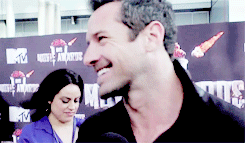
General mood when seeing one of these <3
#ben says stuff#once upon a time comments#my convos with anon#my sleeping pills are kicking in#I'm barely awake#but these deserve to see the light#submission
0 notes
Text
idk how to do readmores on mobile but warning for bbc sher.lock wank
*
*
*
thinking about it.. s3ep3 is really where things went kind of irrevocably off the rails? like there were definitely some not-good things in the rest of season 3 but his last vow takes the fucking cake for sure
like. setting mary up to have a dark secret from her past? cool! interesting! can’t wait to see what’s going on with that! making her actually some kind of mercenary/bad guy?? extra nice!!! coldblooded killer, motivations a complete mystery, putting everyone in danger, worrying moriarty (and later magnussen) parallels, multiple huge hints that she’s sebastian moran!!!! all this is great and i LOVE where this is going, give her the coolest villainous character arc and eventual downfall thru her own villainy!!!!!!!!!!
and we see her shoot sherlock. and the whole scene is fucking beautiful, like The Cinnamon Tography 😩👌💯 and the emotional impact is out of this world, he fucking talks himself thru his own imminent death, we get a glimpse into his inner psyche as his whole world is falling apart and his body is failing. we see him flatline on the operating table and the doctors give him up for dead, and the ONLY thing that saves him, what literally Brings Him Back To Life is the thought that “john watson is definitely in danger. you’re letting him down, sherlock….” the man restarts his own heart thru sheer force of will!! it’s a literal fucking fairytale!!!
(“what’s so important? whatcha got here that’s worth living for?” “truuuue looooooooove……”)
but then like…. not ten minutes after that absolutely pivotal and heart wrenching scene of death by mary and resurrection by john, we as an audience are told that…. mary……… did a good thing??? that her shooting him is justifiable because it actually saved him somehow????? even though we have literally JUST been shown in No uncertain terms that that’s not the case????????????
we’re told it was “surgery,” that she’s such a good shot that her bullet hit in the exact place it needed to to keep him alive, EXCEPT IT DIDNT. THAT LITERALLY DID NOT HAPPEN. HE CANONICALLY, FACTUALLY DIED. made a pretty fuckin big deal of it too!!!!!!!!! the writers just straight up immediately contradict themselves to try and set her up as redeemable
like if you want a character with a secret, violent past to be redeemable and for the audience to root for them, you don’t? make her?? shoot the title character in the chest???? and stop his heart???????? and then remind us mid-death scene that it was, in fact, Her who did this by showing her shooting him again in his mind (in her WEDDING DRESS no less, which is,,,, w o w … there’s some Things to unpack here to say the least)
and then, as if to pile on the insults to our intelligence as an audience, after we’re meant to swallow that we’re immediately fed this bullshit idea that sherlock and mary are somehow morally equivalent??? that they’re both just “dangerous people” and it’s ultimately johns fault that he ended up marrying a secret assassin because somethings wrong with him and he’s just attracted to these “dangerous people” who hurt him and lie to him and make his life hell
even though all sherlocks Big Lies have been for johns own safety, and mary’s Big Lies have been pretty obviously at the expense of his safety??? like they could not be more opposite in their intentions, sherlock sacrifices himself and his reputation and his relationship with john to keep john safe, while mary betrays johns trust and puts him in danger in order to keep him, to own him. “he can’t ever know i lied to him. it would break him, and i would lose him, and i will not let that happen.” that’s not love, that’s selfishness. she doesn’t want to support and protect him, she wants to possess him even if it means lying to him literally 24/7 about everything
and she!! threatens to shoot sherlock again!!!! “i will not let that happen” as she’s holding a gun!! she points it at (what she thinks is) sherlock!!!!! she is literally, actually, obviously willing to murder johns best friend, whose previous “death” emotionally destroyed him for 2 years, in order to Keep him. to Have him.
like… it fucking stings!! to have this deliciously nasty villain set up, make her deception and betrayal incredibly personal to both sherlock and john, have us anticipating an awesome bad-guy character arc culminating in an eventual dramatic and thematically appropriate downfall, what a great character!!!! but of course, Of Fucking Course, that just gets ripped away in favor of some bullshit contrived Redemption Arc
moffat and gatiss don’t seem to think of women as like. actual people who can have those kinds of character journeys? they just have to shove her into the role of the housewife and loving mother, but they don’t even do that well?? she literally never comes across as loving or affectionate or considerate, she is always portrayed as aloof and grating and seems to have no respect for john as a person. she’s like s1-s2 sherlock but without the moments of warmth and genuine caring that got us invested in john and sherlocks relationship, just the casual dismissal and lack of consideration. she like laughs at him and makes fun of him and pokes at his sore spots, they fucking. sit/sleep far apart and hardly ever touch onscreen, they kiss exactly one time and its perfunctory. everything we see about them together is Not Great and does nothing to get us invested in them as a couple
like it just… is incredible to me? that we’re expected to just swallow all this obvious bullshit and Care about mary as the loving wife and mother who eventually sacrifices herself for sherlock. in a frankly baffling scene that had me genuinely convinced for several minutes that the whole episode was fake, that one of the characters was gonna wake up and we’d be treated to what really happened (i was honestly hoping for this by the end of the six thatchers, as cheesy and unsatisfying as Another dream episode would have been)
season 3 was shaky and unstable, his last vow was the initial complete derailment, and all of season 4 was the whole train careening off a cliff and hitting the bottom with a huge cheesy cgi explosion, killing all the passengers on board. me. i’m the passenger and i’m dead inside. thanks for listening to my ted talk
#this doesn't even get into the constant gay jokes! which is!!!! like i could write a fucking dissertation on how insulting and cruel that is#this is purely like. barely below surface level This Doesn't Make Sense shit#bbc sherlock /#ccc
7 notes
·
View notes
Link
Firstly, if you're afraid of spoilers, what are you doing here. I mean, read the title. xDI'm sorry if the text is a bit weird but I rewrote this quite a few times and I'm really tired. If there are any continuity mistakes or any mistakes at all please tell me so I can fix it, and so I don't look as dumb as I am.I'm going to start this with this picture:https://i.redd.it/rx4jgerpryn21.jpgDo you notice the blue light emanating from whatever is behind the doors. It actually gets more intense during the scene in the trailer. Wait... where have we seen a blue light like that in the trailer before...Notice the Upside-Down-ish red around where the beam hits the wallalsohttps://i.redd.it/vam7bbzxryn21.jpgMy (and a few other's) theory is that this machine is something that the Soviets - who will undoubtably play a role in this season - use to reopen a gate to the Upside-Down. In my opinion, the red around the ray looks a lot like the red used for the gate. If you go back to the picure with Dustin, Steve, etc. staring through the glass doors, there might actually be a reflection of the beam at the bottom.For this next part I'll reference this theory: http://bit.ly/2JxYiG8 by u/againreally-comoeon.He thinks he found out the D&D-equivalent to our friend:Notice the (presumably) human spine in it's left legAccording to u/againreally-comoeon this is a Gibbering Mouther. I quote:"It is what happens when the Far Realm (basically an alien dimension outside our own) lightly touches the Prime Material Plane (think earth). It is insane, constantly muttering with its countless mouths and only desiring one thing. To bring more people into itself. When it does this, it gains another mouth and another set of eyes."Even though there are no eyes to speak of here, there are definitely two things that stand out:It only desires one thing: to bring more people into itself.As u/FrosteSon pointed out, there is definitely a spine in this things front leg (http://bit.ly/2U3RkwO (I don't know if he was the first one to point it out, though)). And, at least to me, it looks like it's human. Not the monster. The spine. Since I am, as you, a human being that knows how other fellow humans look. We've heard a few times now that David Cronenbergs style of body-horror will appear in this season. I'd say we found it.It "happens" when the Far Realm slightly touches the Prime Material Plane:Im pretty sure that this sceneNancy in the foreground; Jonathan in the backgroundAlso, I actually think that the first time the Soviets use the Machine will fail. Hence the Upside-Down "lightly touching" the Rightside-Up. I mean, does the picture with all the lightning look to you like a sucess?And all of that is why I also think that the scene with all the lightning also takes place at the same time that the monster transforms.(Also, this scene likely also takes place at the also hospital and happens at around the same time as this picture: http://bit.ly/2JxYjda because both Nancy and Jonathan are still wearing the same clothes and it's still at the hospital. I think it would be a pretty big coincidence if they went to the hospital twice with the same clothes.)Maybe the shortly re-established hivemind-connection to the mindflayer makes Bruce (the new journalist), who is already infected with whatever Billy also had in the trailer, transform into the Mouther. I mean, he looks pretty sick in this scene:Notice the tie. He knows his etiquette even if he's about to transform into a ball of meat.which takes place in the hospital as well (the ceiling is the exact same). The only problem is that there is way to much meat on the Mouther for it to only be made from one human. Maybe there is still a hivemind-connection between the people who are infected and that's how he gathers a few of his (possibly rat) friends to cuddle a bit too hard. But I'm just spitballing here. Let's get back to the more out-figurable stuff. Yes, there is more.Now the question that probably comes to your mind if you've read this is: why the FUN are only Jonathan and Nancy in the hallway with the Mouther? Well, my friend (because if you really read through all of this you undoubtedly are), I have an answer for you:The kids were somewhere else in the hospital (for some reason that we probably can't figure out yet) for a short time and are now coming to help their friends:You can deduce that it's the hospital by the ceiling and the clothes.Actually, El's nose is bleeding. That's probably how they noticed that something is horribly wrong (besides the lights flickering): They were fighting someone or something or multiple of said things.Maybe, if you like it, I'll actually continue this because there are a few other things I noticed but as I said, right now I'm really tired and I just want to get this rant out really quickly. via /r/StrangerThings
0 notes
Text
Doctor Who Reviews from a Female Doctor, Season 3, p. 3
Please note: these reviews contain spoilers for multiple seasons of the reboot, and occasional references to events from the classic series.
Blink: This is an extraordinarily good story, possibly the best individual plotline of any Who episode. I wouldn’t consider it the best episode of all time, as some do, because the focus on single-episode characters prevents it from having the kind of emotional impact that we get in episodes centered on the Doctor and companion. Still, it’s a thrilling story about the sheer possibilities—both exhilarating and terrifying—that are attached to the presence of time travel. Like many of Moffat’s scripts, there is an extraordinarily large number of pieces to the story, but watching them fit together is never burdensome and is consistently delightful, thanks in part to the introduction of a captivating new monster. Most of the attention given to this episode has been devoted to the Angels themselves, who are indeed extraordinarily creepy villains. The quantum-locked statues are great in themselves, and even better in the effect that they have on other characters. Having to avoid blinking in order to ward off attack is a perfect horror-story rule, and the prospect of being suddenly sent back to a different time is convincingly terrifying. The gradual advancement of the Angels, who get closer and scarier every time someone looks away, is wonderfully directed—there’s something marvelously frightening about seeing their before and after pose but not seeing them actually move.
To me, though, the spookiest pieces of the episode don’t involve the Angels themselves but rather the fragments of writing and speech that help Sally to piece the plot together. The literal writing on the wall that opens the episode is fabulously creepy, and the DVD Easter eggs are even better. The Doctor’s efforts to bring about his own rescue through these Easter eggs, sparking lots of analysis in internet forums, is an appropriately nerdy premise for the show, and I love the bits of those forum discussions that we hear about from Larry. He’s a pretty underwritten character, but I can’t dislike anyone who puts “The Angels have the phone box” on a T-shirt. Sally’s initial “conversation” with the Doctor is already fascinating in terms of how the dialogue lines up, but when she watches it again, says different things, and the Doctor’s lines still work in response, it’s pretty mind-blowing, so lots of credit to Moffat for figuring out how to make that work. The whole concept of the Doctor reading from a transcript of a conversation that he’s still having is both a brilliant piece of plotting and an interesting opportunity to think about how free will fits into the idea of time travel. Sally is clearly making choices throughout the episode, and yet everything is unfolding according to the script that the Doctor put together based on Sally’s own notes—the time travel dimension pretty much makes sense of everything, but it’s still a tremendous shakeup of how we usually envision cause and effect.
The characters themselves generally work pretty well. Sally’s relationship with Larry is never convincingly developed—and, really, neither is Larry himself—but she’s a vibrant and engaging presence, aided by the abilities of a not-yet-famous Carey Mulligan. She has more than enough charisma to carry an episode that features very little David Tennant, and while she’s smart and capable, the script avoids making her into an implausibly good character. She’s fun and adventurous, but also a bit pretentious—particularly in her observation that sadness is “happiness for deep people”—and she has a sort of self-serving tendency to push other people into her dangerous adventures. It’s difficult to tell how much of the character’s charm stems from the writing, and how much is just Mulligan’s impeccable screen presence, but whatever the reason, Sally is one of the show’s most memorable single-episode characters. The Doctor makes the most of his small amount of screen time: “Wibbly-wobbly, timey-wimey” is rightfully one of the most famous lines of the reboot, and I also enjoy his flurried reference to the need to deal with “four things and a lizard.” I don’t like that even in an episode that has very little Doctor and even less Martha, we still have time for how uncomfortable their relationship is. He practically shoves her out of the shot when she tries to be in the video, and I don’t really understand why she is supporting him. (It’s the 1960s, she’s a black woman, he’s a white man. Even if he got the exact same job that she did, he would probably get paid twice as much. And yet, the implication is that she is working and he is not. Why?) Their relationship is pretty typical of what it is in much of the rest of the season, but it’s still annoying. Otherwise, though, the Doctor manages to be likeable and impressively memorable, in spite of the lack of screentime.
It’s hard to tell whether we should see this as a magnificent little island of an episode, or as an important harbinger of things to come. While it introduces monsters who will return in later seasons, it’s also a perfectly contained little narrative. However, it also feels like a statement of arrival, more so than either of Moffat’s previous episodes (even if I did like his Season One two-parter a bit better.) His contributions to Season One and (sort of) to Season Two showed him to be a strong writer, but this episode gives us a clearer sense of the kind of writer that he is. I don’t say this because it’s a fairly plot-driven episode, as I think the notion that Moffat made the show more plot-focused is almost completely unfounded, but the intricacy of this story is a good indication of just how much attention Moffat demands from his audience. We’ve still got plenty of the Davies era left to go, but this episode is an early indication that eventually, we’re going to get six full seasons in which a necessary component of understanding the further adventures of the Doctor and company is going to involve keeping your eyes wide open like your life depended on it. A
Utopia: The string of good episodes continues as the Doctor, Martha, and Jack find themselves at the end of the universe. It’s a terrifying place, and probably the most interesting non-Earth planet that Davies develops. The Futurekind are scary in themselves, but the dark world with barely anything left in it is even scarier. Even in this cold, bleak place, though, there is still hope for a better world, and we can see brief moments of warmth between the humans as they wait for Utopia. The emotional investment that this creates for these humans makes their eventual fate even sadder, and their doomed hopes for a new world are really beautifully portrayed here.
For the most part, Davies does an astonishing job of blending a thrilling plot with some lovely character work. The one downside to this episode is that it doesn’t always serve its female characters very well, especially since Jack’s curiosity about Rose means that this episode gives us an extra helping of Morose Martha. I’m not sure what’s more annoying: Jack’s assertion that the Doctor doesn’t abandon his blonde companions (Martha, annoyed: “Oh, she’s blonde!”) or the camera repeatedly cutting back to Martha looking bitter while The Doctor and Jack talk about what happened to Rose. It’s not that I blame Martha, who is responding reasonably to the Doctor’s behavior, but having more than one reference to the stupid Martha-vs.-Rose dynamic in a single episode is too much. Chantho is mostly used as an end-of-the-universe equivalent to Martha, as the script goes out of its way to point out that “Look! Professor Yana has a woman quietly pining away for him, just like the Doctor!” She and Martha then strike up a cute friendship, though, so the episode mostly emerges from the boring treatment of women that we get at the start.
Other than inadvertently heightening Martha’s resentment toward Rose, Jack makes a triumphant return here. (So does the Doctor’s severed hand, which Davies does a wonderful job of weaving into the plot of Tennant’s entire time on the show.) He’s just as charming and fun as he was in the first season, and we get a wonderful discussion between him and the Doctor regarding the Doctor’s abandonment of him after the defeat of the Daleks. It’s such a brief moment in “The Parting of Ways” that it would be easy to gloss over it, so I appreciate that the episode takes the time to describe Jack’s experience and to let him confront the Doctor about what he did. The Doctor’s excuse—that Jack is a fixed point in time, and therefore goes against the Doctor’s Time Lord gut instincts—is understandable, but not really sufficient to excuse the Doctor’s decision to just leave him behind. Jack isn’t particularly bitter here, though; he’s honest about what he’s gone through, but he’s still kindly disposed toward the Doctor and (of course) somewhat flirtatious toward him. Tennant and Barrowman have excellent chemistry, and the scene gracefully and effortlessly conveys their extremely complicated relationship.
The highlight of the episode, though, is Derek Jacobi’s portrayal of Professor Yana/The Master. I wish there was time for him to be in more than one episode, but he’s brilliant here, both as the kind, self-sacrificing professor and as the newly-aware Time Lord. His interactions with the Doctor and with Martha are marvelously done, and the growing awareness of his real identity is just superbly plotted. The drumming in his head is not always well-handled in future episodes, but Jacobi plays this element of his character with a great deal of sensitivity. The big reveal is an especially fabulous moment: the watch, the drumbeats, and the various other bits of the story slot together perfectly, and culminate in a terrific showdown between the Doctor and the new regeneration of the Master. Chantho’s scared but determined resistance gives us a great final moment for Jacobi’s Master, and Simm’s performance is an immediately enjoyable piece of ham. The final scene, in which the Master takes over the TARDIS, leaving the Doctor and company trapped at the end of the universe, is a stunning cliffhanger.
The episode’s conclusion is so excitingly plotted that it’s easy to miss some of the quieter, more philosophical work that Davies does with the Master here. We never quite get a clear sense of what the relationship is between a Time Lord’s actual personality and the human created by the watch; the Doctor tells Joan that he is capable of all that John Smith was, but there are also pretty clear differences between the two. The watch certainly does quite a lot of rewriting, but it doesn’t seem to create a completely new personality, which means that there are at least some similarities between Yana and the Master. It’s a fascinating thought, as until his memories return, Yana is kind and self-sacrificing. It’s a bit odd to me that Tennant doesn’t refer to this in the next episode, but for purposes of this episode, I like the subtlety with which Davies sets up the possibility that the Master might have quite a lot of goodness inside him. (This wouldn’t have been the intention at the time, but it also provides a nice bit of setup for the Twelfth Doctor’s later confidence that Missy can be redeemed.)
This episode sometimes gets overlooked a bit because of the flashier ones that preceded and follow it, but I really do think this is a sensational story. It’s fast-paced and scary, we get to explore an eerie new place, Jack Harkness is back, and the Master gets a great new incarnation. There are a couple of scenes that annoy me, but of the three parts of the season finale, I would say this one is my favorite. A/A-
The Sound of Drums: This episode is already starting to show how much Davies is straining to pull the plot arc together, but it’s such an exuberant episode that it’s easy to overlook the problems for now. A lot happens in this episode, which necessitates a certain amount of rushing; this is apparent from the opening scene, in which the previous episode’s cliffhanger (The Doctor, Martha, and Jack are trapped at the end of the universe without the TARDIS!!) is easily resolved by Jack having a time travel device that will transport all three of them. The Jones family would also have benefited from a bit more screentime here—what happens to them is shocking, but we aren’t given enough of the intriguing situation of Tish working for the Master, or of their reaction to their eventual capture. We really needed to get a clearer sense of how the Archangel Network functions, or possibly just a different sense, as I’m pretty sure it just changes completely between this episode and the next. When the story does invest sufficient time and detail into its narrative elements, though, it’s tremendously fun.
Simm is charmingly evil here, and Davies’s script allows the Master to have a wonderful time taking over the world and messing with the Doctor’s mind. There are moments of extremely dark humor, such as his nonchalant murder of the entire cabinet with poisonous gas and his casual efforts to close the door on Vivien’s death screams. He has excellent chemistry with Tennant, particularly in the beautifully acted phone call, and it’s surprisingly delightful to see him watch The Teletubbies. He gets even more fun as he begins his strategy of cheerfully irritating the American president—a strategy that includes sitting down and pulling out some jelly babies. I love that in the midst of plotting world domination, he made the time to think “I’m going to bring the Doctor’s favorite snack to my glorious victory.” By the end of the episode, he is joyfully welcoming the Toclafane to the strains of “Voodoo Child,” and it’s just such an astonishing moment of silliness that it’s a perfect return for the Master. John Simm got stuck with some odd writing on this show, some of which shows up in the next episode and quite a lot of which appears in “The End of Time,” but this episode proves that when he is given good material, he’s an absolutely stellar Master. It helps that he has to spend much of the episode reining himself in just a little bit in order to plausibly function as prime minister, so that when he breaks into a much broader persona toward the end it really feels like a rise in energy and doesn’t seem like overkill. The constant drumbeat that he hears, which was approached with considerable nuance in the last episode, has turned into a cartoonish version of insanity; still, the episode makes no effort to pass this off as a realistic portrayal of mental illness, so it doesn’t really bother me. The scenery-chewing madness goes too far when he returns in “The End of Time,” but for this season, Simm does a good job of depicting an intentionally silly persona.
Our main characters’ fugitive status lets them stay near the main action but also separate from it, which gives us lots of time to just watch them talk to each other and react to the situation. Their conversation about the Master is one of my favorite scenes of the whole season—the Doctor’s description of the treatment of Time Lord children is beautifully written and performed, and there is a wonderful sense of sympathy between the three characters here. The Doctor ends the scene by distributing perception filters, which I always love—there’s something about the ability to make yourself unseen without actually being invisible that I find absolutely thrilling every time it’s introduced on the show. Granted, the Doctor then goes a long way toward undoing the scene’s positive energy by explaining that perception filters are like fancying someone who doesn’t notice you, making me immensely aggravated that his thoughtlessness toward Martha is now being treated as a joke. Still, there’s a nice moment between Martha and Jack as they realize that they’re both in the same position in terms of their feelings toward the Doctor. Martha gets quite a lot of good material in this episode; I especially love that she gets to be in the driver’s seat for the car chase, and while I think her family is itself underwritten, her concern for them is portrayed very well.
The Doctor’s relationship with the Master is the heart of the episode, and Tennant really sells his conflicted feelings of wanting to protect the world from the Master while also wanting to protect the one Time Lord he didn’t destroy. I don’t really understand the choice to avoid any mention of his own experiences as a human; the Doctor tries so hard, at first, to find a scrap of empathy in the Master that you would think “I went through the same experience of becoming human and forgetting my real identity for a while” would be a good approach. Nonetheless, his relationship with the Master is intriguing throughout the episode, and his determination to save the man who was once his friend seems incredibly heartfelt in spite of the Master’s over-the-top evil. I spend so much of the episode focusing on the Master and his interactions with the Doctor that the actual plot events fade a bit in comparison, but there are some good things here, especially the reveal that the Master has turned the TARDIS into a paradox machine. The Toclafane aren’t very interesting aliens until you find out who they are in the next episode, but they’re certainly a major threat and they give the Master an opportunity to really put on a show. The whole business with aging the Doctor doesn’t work very well and is an awfully random thing to do, but it’s the only real false note marring an otherwise sensational ending. The Toclafane have landed, the Master is dancing, and Martha is off to save the world on her own—not a bad cliffhanger to take us into the finale. A/A-
The Last of the Time Lords: I can get past plot holes. An episode full of them might not be my very favorite, but they don’t necessarily prevent me from enjoying the story. The worst kind of plot holes, though, are the kind that make the characters look idiotic, and we get an avalanche of those here. First, we have the Master, who comes across as so unbelievably stupid that I cease to see him as a meaningful antagonist. I get that he’s insane, and sort of a pantomime villain, but in the previous episode he at least looked like he had a sizeable streak of brilliance as well. In this episode, he’s got spies everywhere and a huge amount of leverage over people whose families he’s kidnapped, and yet he can’t manage to find out a plan at least some of which is known to most of the Earth’s population. Martha has spread the strategy of believing really hard in the Doctor during the countdown to what seems like millions, so the notion that the Master wouldn’t have caught on to this and would still be believing in the multi-colored gun plan just isn’t plausible. (I can sort of imagine him dismissing the plan, because he doesn’t believe in the power of human goodness in the way that the Doctor does, but I can’t imagine him just not figuring it out at all.)
Martha herself comes across as incredibly courageous here, but the nature of the plan just doesn’t allow her to shine in the way that I want her to. I would actually have preferred it if the plot twist had been close to the reverse of what occurs at the end. If Martha had let the Master believe that she was going around spreading the Gospel of the Doctor like a good little companion as a cover to hide the fact that she was using her scientific knowledge to help turn the Archangel Network against him, that would have been amazing, and not really difficult to believe. As a medical student, she’s had practice in trying to figure out what’s wrong with other people. (Just ask the patient, said the snotty, ill-fated teacher in Martha’s first episode.) She knows how to figure out the use of complex machinery by quickly consulting the manual, as we also learned in that same episode. She has very precise knowledge of the human body, as we can see in her precise account of the bones of the hand in her conversation with Joan. I can imagine an episode in which Martha traveled the Earth, pretending to spread the news of the Doctor’s magnificence but also making observations and asking questions about how the Archangel Network made people feel, consulting the network’s manual, figuring out exactly how the mind control works and how it could be redirected, and using that to surprise the Master at the end of the episode. Then we wouldn’t have needed floaty Jesus Doctor, there would at least be sort of a reason for the Master being flummoxed, and the whole season of Martha being reduced to an unrequited love plot would at least have a great resolution; I would genuinely be less mad at scenes like the “Rose would know” moment in “The Shakespeare Code” if we were moving toward a finale in which Martha completely subverted the expectations created by her feelings for the Doctor. Instead, she just goes around talking about what a magical, wonderful, sparkly unicorn the Doctor is, omitting all of the darker elements of his nature and treating him like an absolutely perfect hero. It’s a nice continuation of the idea of the power of words, as set up in “The Shakespeare Code,” but it would be a lot more meaningful if there wasn’t a lingering sense that she’s using her words to hide elements of the Doctor as often as to reveal the truth about him.
And then there is the Doctor himself. (I was really uncomfortable with the Doctor’s behavior in this episode, but was uncertain about why until I read the AV Club’s review, which makes a lot of the same points as what follows.) It’s bad enough that he spends much of the episode as Dobby the Elf/Gollum/whatever other fantasy creature you want to compare him to here. David Tennant’s odd, joyful presence is most of what makes this character work, so when he’s absent for much of the episode, it is sad. However, his return is constructed in such a way that it winds up being more aggravating than spending much of an episode without him. The Doctor has gone through an awfully dark period. He was in so angry and grief-stricken a place in the Christmas special after the loss of Rose that he killed off an entire species and would have accidentally drowned himself (as we learn next season) if Donna hadn’t stopped him. He was so infuriated at the end of “The Family of Blood” that he basically condemned four beings to eternal torment. He’s been so morose about Rose that he has mistreated Martha basically for the entirety of the season. He’s just had a couple of experiences that might be eye-opening to him: he’s had to hear about his abandonment of Jack Harkness from Jack’s perspective, and he’s gotten a reminder of the immense darkness in the one remaining Time Lord, one who was once his friend. He’s also seen the bleakness of the end of the universe, which might serve as a humbling reminder of his inability to actually fix everything. (The reveal that the Toclafane are humans is a pretty good moment of darkness, although the erasure of everything that they actually do in this episode does diminish this a bit.) The Doctor, until the Archangel Network nonsense happens, seems like someone who becoming aware of and at least starting to hold himself a little bit accountable for the problematic aspects of his behavior. There are a lot of ways to deal with this: there is something to be said for giving the Doctor a genuine crisis of conscience, and also something to be said for having him come to a partial realization of his own flaws and continuing to develop it more subtly over time. What you shouldn’t do, basically the one thing you definitely SHOULD NOT do in this scenario, is resolve your major seasonal arc by comparing this character to Jesus. Avoiding that should pretty much be your top priority. And yet, not only does the mass of strangers treat him like a Christ figure, he completely leans in to the comparison. His arms aren’t quite high enough to constitute an imitation of Jesus on the cross, but the position is close enough that the suggestion is there. When he starts floating around with his hands outstretched, looking like someone doing an almost-crucifixion pose on an invisible motorized scooter, smiling beatifically and extending his magnanimous forgiveness to the Master, it’s not just that it looks silly. (It does look silly, but the show’s made that work plenty of times.) It’s not even just that the Archangel Network, which appeared to be coded signals that used the four successive beats as a form of mind control in the previous episode, has now somehow become sentient enough to understand the words of people all over the world and to de-age him as a result; the Doctor claiming that he’s been attuning his mind to the network does nowhere near enough to make sense of this, but I could mostly overlook this if everything else was all right here. The main problem is that the Doctor has chosen to embrace his smug, morally superior side, at the expense of every bit of character development that has been in the works this season. He even suggests that humanity’s willingness to have absolute faith in him here, basically just on Martha’s word, is evidence of the greatness of our species, and I’m not sure that he’s ever had a more arrogant moment on this show.
It’s not that I want everyone to turn on the Doctor and hate him for the few flaws that trouble a generally wonderful personality. Forgiveness and redemption are important elements of this show, but in order for them to be have the kind of impact that they should, there needs to be a sense that they are bestowed or achieved from a position of knowledge of what has gone wrong. The people who Tinkerbell him back to looking like David Tennant know very little of the Doctor’s problems—I certainly don’t get the sense that Martha is giving them the full version of his story. The Doctor has had a lot of time in this episode to reflect on his own failings, but he concludes that reflection here through being redeemed by the faith of people who believe in him because they’ve been given the sugarcoated version of his story, and it’s just such an empty conclusion to the work of the season that it’s an incredibly disappointing moment. Having the whole world express their belief in the Doctor as the embodiment of the ideals that he’s been failing to live up to all season could be an interesting moment if the Doctor was at least aware of the dissonance, but he seems to buy into his own myth so thoroughly that the episode essentially erases everything the season has done to complicate his character. There are plenty of moments in this reboot in which the Doctor behaves in problematic ways, but usually these are individual moments, and he redeems himself fairly quickly afterward. There are, therefore, plenty of times when I don’t like what the Doctor is doing, but I generally still really like him as a character. This is the one moment in which I sort of question where I stand toward the character as a whole; he just seems so utterly oblivious of his own flaws and so self-indulgent that I’m not sure about whether he’s a character I can admire.
He does win me back quite quickly, as Tennant does a beautiful job of portraying the Doctor’s grief over the death of the Master. Lucy Saxon’s murder of her husband would be a better moment if the episode hadn’t done so much to telegraph that something was going to go wrong with her; her behavior early in the episode shows her to be just barely holding herself back from snapping, so it’s not much of a surprise when it happens. Otherwise, though, the death and funeral pyre of the Master are sublimely done, and I’m so sad for the Doctor as he cradles his dying rival that I can almost forget how annoying he has been in this episode. I do wish that he had saved a little bit of that grief for his separation from Martha, which he accepts with irritating equanimity. It’s a fantastic moment for her, as she decides to walk out for her own emotional health, and actually gets to leave the TARDIS on her own terms instead of the usual story of being forced out by disaster. Given that the Doctor nearly lost his mind after being separated from Rose and even Joan, it’s a little sad that he doesn’t have a bit more of a reaction to the departure of a woman who has just spent a year (an erased year, but a year nonetheless) traveling the Earth to help him. It’s still a good scene for her, and, in general, the episode’s last few minutes work much better than the nonsense that preceded them. Even with some really good moments, though, an episode in which the Master looks like an absolute moron, Martha saves the world but in a dull, clichéd fashion, and the Doctor loses all sense of perspective is not a satisfying end to the season. C+/C
#doctor who#female doctor#tenth doctor#martha jones#david tennant#freema agyeman#russell t davies#steven moffat#season 3#reviews
0 notes